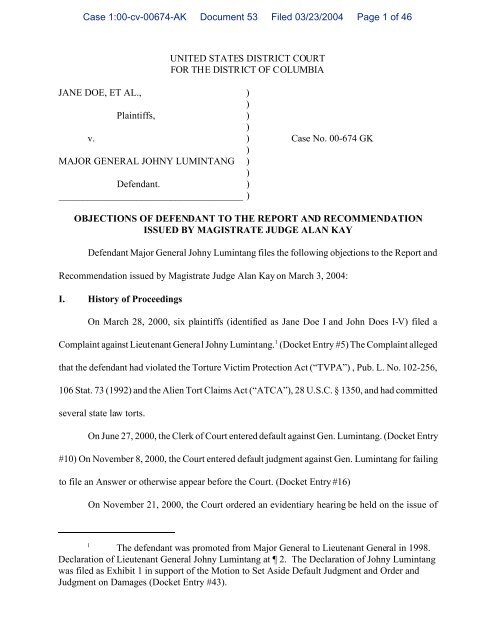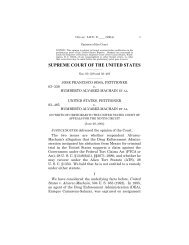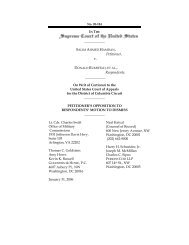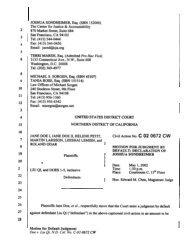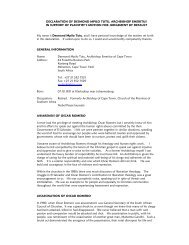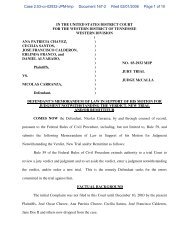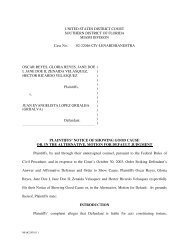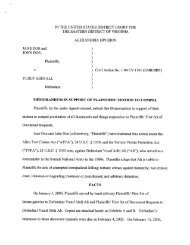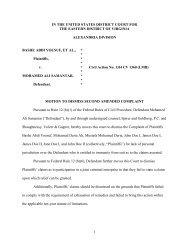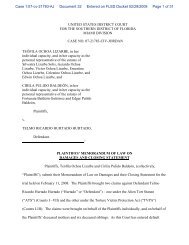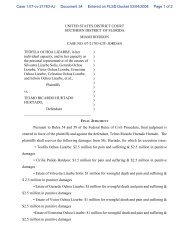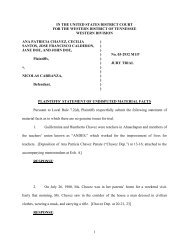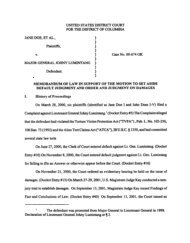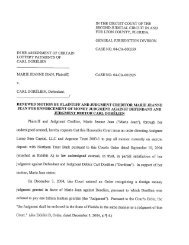Memo of Defendant's Objections to the Report & Recommendation
Memo of Defendant's Objections to the Report & Recommendation
Memo of Defendant's Objections to the Report & Recommendation
Create successful ePaper yourself
Turn your PDF publications into a flip-book with our unique Google optimized e-Paper software.
Case 1:00-cv-00674-AK Document 53 Filed 03/23/2004 Page 1 <strong>of</strong> 46UNITED STATES DISTRICT COURTFOR THE DISTRICT OF COLUMBIAJANE DOE, ET AL., ))Plaintiffs, ))v. ) Case No. 00-674 GK)MAJOR GENERAL JOHNY LUMINTANG ))Defendant. )______________________________________ )OBJECTIONS OF DEFENDANT TO THE REPORT AND RECOMMENDATIONISSUED BY MAGISTRATE JUDGE ALAN KAYDefendant Major General Johny Lumintang files <strong>the</strong> following objections <strong>to</strong> <strong>the</strong> <strong>Report</strong> and<strong>Recommendation</strong> issued by Magistrate Judge Alan Kay on March 3, 2004:I. His<strong>to</strong>ry <strong>of</strong> ProceedingsOn March 28, 2000, six plaintiffs (identified as Jane Doe I and John Does I-V) filed aComplaint against Lieutenant General Johny Lumintang. 1 (Docket Entry #5) The Complaint allegedthat <strong>the</strong> defendant had violated <strong>the</strong> Torture Victim Protection Act (“TVPA”) , Pub. L. No. 102-256,106 Stat. 73 (1992) and <strong>the</strong> Alien Tort Claims Act (“ATCA”), 28 U.S.C. § 1350, and had committedseveral state law <strong>to</strong>rts.On June 27, 2000, <strong>the</strong> Clerk <strong>of</strong> Court entered default against Gen. Lumintang. (Docket Entry#10) On November 8, 2000, <strong>the</strong> Court entered default judgment against Gen. Lumintang for failing<strong>to</strong> file an Answer or o<strong>the</strong>rwise appear before <strong>the</strong> Court. (Docket Entry #16)On November 21, 2000, <strong>the</strong> Court ordered an evidentiary hearing be held on <strong>the</strong> issue <strong>of</strong>1The defendant was promoted from Major General <strong>to</strong> Lieutenant General in 1998.Declaration <strong>of</strong> Lieutenant General Johny Lumintang at 2. The Declaration <strong>of</strong> Johny Lumintangwas filed as Exhibit 1 in support <strong>of</strong> <strong>the</strong> Motion <strong>to</strong> Set Aside Default Judgment and Order andJudgment on Damages (Docket Entry #43).
Case 1:00-cv-00674-AK Document 53 Filed 03/23/2004 Page 2 <strong>of</strong> 46damages. (Docket Entry #15) On March 27-29, 2001, U.S. Magistrate Judge Kay conducted a nonjurytrial <strong>to</strong> establish damages. On September 13, 2001, Magistrate Judge Kay issued Findings <strong>of</strong>Fact and Conclusions <strong>of</strong> Law. (Docket Entry #40) On September 13, 2001, <strong>the</strong> Court issued anOrder that judgment be entered on behalf <strong>of</strong> <strong>the</strong> plaintiffs against Gen. Lumintang for $66 millionin compensa<strong>to</strong>ry and punitive damages. (Docket Entry #41)On March 25, 2002, Gen. Lumintang filed a motion <strong>to</strong> set aside <strong>the</strong> default judgment andorder and judgment on damages. (Docket Entry #42). Gen. Lumintang asserted that all judgments<strong>of</strong> this Court issued against him were void as matters <strong>of</strong> law, under Rule 60(b)(4) <strong>of</strong> <strong>the</strong> FederalRules <strong>of</strong> Civil Procedure, because <strong>the</strong> Court did not have personal jurisdiction over him or subjectmatter jurisdiction over <strong>the</strong> claims brought against him. Alternatively, Gen. Lumintang asserted that,even if <strong>the</strong> Court had personal and subject matter jurisdiction, <strong>the</strong> judgments against him should beset aside in accordance with Rule 60(b)(6), because <strong>the</strong> extraordinary circumstances <strong>of</strong> this case and<strong>the</strong> demands <strong>of</strong> justice compel such relief.On March 3, 2004, Magistrate Judge Kay issued a report and recommendation that <strong>the</strong>motion <strong>to</strong> set aside be denied. Magistrate Judge Kay determined that Gen. Lumintang had beenserved with process while in <strong>the</strong> United States, and <strong>the</strong>refore, this Court had personal jurisdictionover him. Magistrate Judge Kay also determined that this Court had subject matter jurisdiction over<strong>the</strong> plaintiffs’ claims and that <strong>the</strong>re were no extraordinary circumstances compelling <strong>the</strong> setting aside<strong>of</strong> <strong>the</strong> default judgment.II.Objection One — Magistrate Judge Kay Improperly Found that Gen. Lumintang WasPersonally Served by <strong>the</strong> Plaintiffs at Dulles International Airport. Based on <strong>the</strong>Conflicting Evidence, an Evidentiary Hearing Should Have Been Held.An in personam judgment entered without personal jurisdiction over a defendant is void as2
Case 1:00-cv-00674-AK Document 53 Filed 03/23/2004 Page 3 <strong>of</strong> 46<strong>to</strong> that defendant. Combs v. Garin Trucking, 825 F.2d 437, 442 (D.C. Cir. 1987). And, becauseservice <strong>of</strong> process is <strong>the</strong> means by which a court asserts jurisdiction <strong>to</strong> adjudicate <strong>the</strong> rights <strong>of</strong> aparty, it is uniformly held that a judgment is void where <strong>the</strong> requirements for effective service havenot been satisfied. Id. (reversing default judgment because defendant was never properly served withprocess); see also, Mobern Electric Corp. v. Walsh, 197 F.R.D. 196, 198 (D.D.C. 2000); MCITelecommunications Corp. v. The Travel Specialist, 1991 U.S. Dist. LEXIS 12878, *2-5 (D.D.C.Sept. 17, 1991); Rogers v. Hartford Life and Accident Ins. Co., 167 F.3d 933, 940 (5 th Cir.1999)(“When a district court lacks jurisdiction over a defendant because <strong>of</strong> improper service <strong>of</strong>process, <strong>the</strong> default judgment is void and must be set aside under Federal Rule <strong>of</strong> Civil Procedure60(4)(b)); Carimi v. Royal Carribean Cruise Line, Inc., 959 F.2d 1344, 1345 (5 th Cir. 1992).Magistrate Judge Kay incorrectly determined that Gen. Lumintang was served with process.<strong>Report</strong> and <strong>Recommendation</strong> at 6-13. Gen. Lumintag is a citizen and resident <strong>of</strong> <strong>the</strong> Republic <strong>of</strong>Indonesia. Lumintang Dec. at 1. He has never been a resident <strong>of</strong> any State <strong>of</strong> <strong>the</strong> United States or<strong>the</strong> District <strong>of</strong> Columbia and has never resided in <strong>the</strong> United States. Id. at 8. On March 6, 2000,Gen. Lumintang received an invitation from Ambassador Edward Masters, <strong>the</strong> President <strong>of</strong> Usindo(United States — Indonesian Society), 1625 Massachusetts Ave., N.W., Washing<strong>to</strong>n, DC 20036-2245, <strong>to</strong> participate in a panel discussion in Washing<strong>to</strong>n DC on March 28, 2000. Id. at 4. Gen.Lumintang came <strong>to</strong> <strong>the</strong> United States <strong>to</strong> participate in <strong>the</strong> panel discussion. Id.On March 30, 2000, Gen. Lumintang left <strong>the</strong> United States for Frankfurt, Germany on an AirFrance flight from Dulles International Airport. Id. at 5. On March 30, 2000, around 5:00 P.M.,on <strong>the</strong> way <strong>to</strong> leaving for Jakarta, Gen. Lumintang arrived at Dulles in <strong>the</strong> company <strong>of</strong> BrigadierGeneral Dadi Susan<strong>to</strong>. Id. at 9; Declaration <strong>of</strong> Brigadier General Dadi Susan<strong>to</strong> (“Susan<strong>to</strong> Dec.”)3
Case 1:00-cv-00674-AK Document 53 Filed 03/23/2004 Page 4 <strong>of</strong> 46at 4. 2 Gen. Lumintang and Gen. Susan<strong>to</strong> were in <strong>the</strong> concourse outside <strong>of</strong> <strong>the</strong> boarding area forGen. Lumintang’s Air France flight, when <strong>the</strong>y were approached by a Caucasian man who was astranger <strong>to</strong> <strong>the</strong>m. Id. The man sought <strong>to</strong> identify General Lumintang. Id. The man never identifiedhimself or his purpose. Lumintang Dec. at 9. After Gen. Lumintang identified himself, <strong>the</strong> manattempted <strong>to</strong> hand him a thick sheaf <strong>of</strong> papers. Lumintang Dec. at 9.; Susan<strong>to</strong> Dec. at 4. Gen.Lumintang had no idea that this man was trying <strong>to</strong> serve him with legal papers. Lumintang Dec. at 9. Fearing that <strong>the</strong> papers were a weapon or explosive device, Gen. Susan<strong>to</strong> simultaneously <strong>to</strong>ldGen. Lumintang not <strong>to</strong> take <strong>the</strong> papers and knocked <strong>the</strong> papers out <strong>of</strong> <strong>the</strong> man’s hand <strong>to</strong> <strong>the</strong> ground.Lumintang Dec. at 9.; Susan<strong>to</strong> Dec. at 4. Gen. Lumintang never <strong>to</strong>uched or read <strong>the</strong> papers from<strong>the</strong> man. Id. The man left without saying anything else or picking up <strong>the</strong> papers. Id. Gen. Lumintang<strong>the</strong>n went <strong>to</strong> <strong>the</strong> boarding area with Gen. Susan<strong>to</strong> and boarded his plane without ever <strong>to</strong>uching orreceiving <strong>the</strong> papers from <strong>the</strong> man. Id. Gen. Susan<strong>to</strong> instructed his driver <strong>to</strong> pick up <strong>the</strong> papers andtake <strong>the</strong>m <strong>to</strong> his car. Susan<strong>to</strong> Dec. at 5.Thus, <strong>the</strong> summons and complaint were never personally delivered <strong>to</strong> Gen. Lumintang.Lumintang Dec. at 9-10; Susan<strong>to</strong> Dec. at 4-5. The attempt <strong>to</strong> serve <strong>the</strong> General by <strong>the</strong> processserver was not sufficient <strong>to</strong> effectuate service. Liberal construction <strong>of</strong> Rule 4 “cannot be utilized asa substitute for <strong>the</strong> plain legal requirement as <strong>to</strong> <strong>the</strong> manner in which service <strong>of</strong> process can be had.”Combs, 825 F.2d at 446. Under <strong>the</strong> clear rules, an individual is only served when he personallyreceives a copy <strong>of</strong> <strong>the</strong> summons and complaint. The General was never personally received a copy<strong>of</strong> <strong>the</strong> summons and complaint. The process server never attempted <strong>to</strong> explain his purpose.Lumintang Dec. at 9. After Gen. Susan<strong>to</strong> knocked <strong>the</strong> papers <strong>to</strong> <strong>the</strong> ground, <strong>the</strong> process server left2The Declaration <strong>of</strong> Brig. Gen. Dadi Susan<strong>to</strong> was filed as Ex. 4 in support <strong>of</strong> <strong>the</strong>Motion <strong>to</strong> Set Aside Default Judgment and Order and Judgment on Damages (Docket Entry #43).4
Case 1:00-cv-00674-AK Document 53 Filed 03/23/2004 Page 5 <strong>of</strong> 46without effectuating service. Lumintang Dec. at 9; Susan<strong>to</strong> Dec. at 4. Gen. Lumintang was neveraware that a process server was attempting <strong>to</strong> serve him with legal papers. Lumintang Dec. at 9-10. Thus, service is invalid because Gen. Lumintang never personally received process.Plaintiffs submitted declarations from an employee <strong>of</strong> <strong>the</strong> East Timor Action Network and<strong>the</strong> process server it hired, alleging that defendant was properly served at Dulles InternationalAirport. The statements in <strong>the</strong>se declarations directly contradicted those <strong>of</strong> Gen. Lumintang andGen. Dadi Susan<strong>to</strong>. Plaintiffs claim that <strong>the</strong>ir declarations are unchallengeable and <strong>the</strong> declarations<strong>of</strong> <strong>the</strong> Indonesians are false. Magistrate Judge Kay reaches <strong>the</strong> dubious conclusion that <strong>the</strong> affidavits<strong>of</strong> two Indonesian Generals and a driver are inherently less credible than <strong>the</strong> affidavits <strong>of</strong> a U.S. EastTimorese activist and her paid process server.The proper course <strong>of</strong> action for <strong>the</strong> Court <strong>to</strong> have followed in this situation would have been<strong>to</strong> allow discovery on <strong>the</strong> issue and conduct an evidentiary hearing so that <strong>the</strong> witnesses can be crossexaminedand <strong>the</strong>ir credibility and veracity can be ascertained in open court. Magistrate Judge Kayincorrectly failed <strong>to</strong> follow Weiss v. Glemp, 792 F. Supp. 215 (S.D.N.Y. 1992), a case virtuallyidentical <strong>to</strong> <strong>the</strong> instant matter, in which <strong>the</strong> court determined that an evidentiary hearing should beheld in <strong>the</strong> face <strong>of</strong> conflicting evidence on <strong>the</strong> issue <strong>of</strong> service <strong>of</strong> process.In Weiss, defendant Cardinal Josef Glemp sought <strong>to</strong> dismiss a complaint filed by Rabbi AviWeiss based on insufficiency <strong>of</strong> service <strong>of</strong> process. Id. at 218. On September 25, 1991, a processserver, attempted <strong>to</strong> serve <strong>the</strong> Cardinal with a summons and complaint. Id. at 217. In an affidavit,<strong>the</strong> Cardinal claimed that although he saw a hand extending papers <strong>to</strong>ward him, at no time did papersever <strong>to</strong>uch him and he never knew that someone was attempting <strong>to</strong> give him <strong>of</strong>ficial court papers.Id. at 218. Two affidavits substantially supported Cardinal Glemp’s version. Id. In an opposing5
Case 1:00-cv-00674-AK Document 53 Filed 03/23/2004 Page 6 <strong>of</strong> 46affidavit, <strong>the</strong> process server, stated that she announced <strong>to</strong> Cardinal Glemp that she was an <strong>of</strong>ficer <strong>of</strong><strong>the</strong> court, she had legal papers for him, she placed <strong>the</strong> papers under <strong>the</strong> Cardinal’s arm, and thatano<strong>the</strong>r priest knocked <strong>the</strong>m <strong>to</strong> <strong>the</strong> ground and picked <strong>the</strong>m up. Id. Ano<strong>the</strong>r plaintiff witnessessentially corroborated <strong>the</strong> process server’s version <strong>of</strong> <strong>the</strong> events. Id. at 219.Contrary <strong>to</strong> <strong>the</strong> Magistrate Judge’s chosen manner <strong>to</strong> resolve this dispute by disregardingdefendants’ affidavits and adopting plaintiffs’, <strong>the</strong> court in Weiss conducted an evidentiary hearingin which all <strong>of</strong> <strong>the</strong> witnesses were examined and cross-examined in open court <strong>to</strong> ascertaincredibility and veracity. Id. at 220-223. The court found that <strong>the</strong> process server and her witness liedin <strong>the</strong>ir testimony and discredited both <strong>of</strong> <strong>the</strong>m as witnesses. Id. at 223. As a result, <strong>the</strong> courtconcluded that <strong>the</strong> attempted service on Cardinal Glemp was not effected by <strong>the</strong> plaintiff. Id. at 225.As in Weiss, <strong>the</strong> proper way <strong>to</strong> resolve this “battle <strong>of</strong> <strong>the</strong> affidavits” is <strong>to</strong> allow discovery andhold an evidentiary hearing, not <strong>to</strong> unilaterally adopt plaintiffs’ claims. At this stage, <strong>the</strong>re simplyis no way <strong>to</strong> ascertain which version <strong>of</strong> <strong>the</strong> facts is true. 3Magistrate Judge Kay’s attempt <strong>to</strong> distinguish <strong>the</strong> Weiss decision from <strong>the</strong> instant matter isunavailing. Relying upon <strong>the</strong> decision in Doe v. Karadzic, 1996 U.S. Dist. LEXIS 5291, 5295-6(S.D.N.Y. 1996), Magistrate Judge Kay asserts that Gen. Susan<strong>to</strong> acted as a door slamming in front3Courts have endorsed <strong>the</strong> conducting <strong>of</strong> an evidentiary hearing, as opposed <strong>to</strong>engaging in a “battle <strong>of</strong> affidavits,” in order <strong>to</strong> obtain a more complete understanding <strong>of</strong> <strong>the</strong>underlying events prior <strong>to</strong> rendering a ruling. See, Reneer v. Wall, 916 F.2d 713, 1990 U.S. App.LEXIS 18213, *10-11 (6 th Cir. 1990), cert. denied, 498 U.S. 1101 (1991); Virgin EnterprisesLimited v. American Longevity, 2001 U.S. Dist LEXIS 11456, *43 (S.D.N.Y August 7, 2001).In fact, in <strong>the</strong> seminal case cited by plaintiffs in support <strong>of</strong> <strong>the</strong>ir position, <strong>the</strong> appellate courtremanded <strong>the</strong> case back <strong>to</strong> <strong>the</strong> lower court <strong>to</strong> conduct a trial on whe<strong>the</strong>r <strong>the</strong> defendant’s versionor <strong>the</strong> process server’s version <strong>of</strong> <strong>the</strong> facts surrounding service <strong>of</strong> process was correct. Hicklin v.Edwards, 226 F.2d 410, 414 (8 th Cir. 1955). The majority <strong>of</strong> <strong>the</strong> cases cited by <strong>the</strong> MagistrateJudge involve service by federal marshals prior <strong>to</strong> <strong>the</strong> amendment <strong>of</strong> <strong>the</strong> rule that allows serviceby anyone over <strong>the</strong> age <strong>of</strong> eighteen. Allowing plaintiffs <strong>to</strong> hire <strong>the</strong>ir own process server opens<strong>the</strong> door <strong>to</strong> legitimate claims <strong>of</strong> process server falsification.6
Case 1:00-cv-00674-AK Document 53 Filed 03/23/2004 Page 8 <strong>of</strong> 46personal service was effectuated at Dulles International Airport in Fairfax County, Virginia, not in<strong>the</strong> District <strong>of</strong> Columbia. Service <strong>of</strong> process on a person while physically within <strong>the</strong> Commonwealth<strong>of</strong> Virginia confers personal jurisdiction over General Lumintang upon <strong>the</strong> state courts <strong>of</strong> generaljurisdiction <strong>of</strong> Virginia. Burnham v. Superior Court <strong>of</strong> California, 495 U.S. 604, 619(1990)(“[J]urisdiction based on physical presence alone constitutes due process because it is one <strong>of</strong><strong>the</strong> continuing traditions <strong>of</strong> our legal system that define <strong>the</strong> due process standard <strong>of</strong> ‘traditionalnotions <strong>of</strong> fair play and substantial justice.’”)(plurality opinion); Kadic v. Karadzic, 70 F.3d 232,246-47 (2d Cir. 1995)(upholding Sou<strong>the</strong>rn District <strong>of</strong> New York’s exercise <strong>of</strong> personal jurisdictionover foreign national served with summons while physically present in Sou<strong>the</strong>rn District <strong>of</strong> NewYork). Service <strong>of</strong> process on a person while physically within <strong>the</strong> Commonwealth <strong>of</strong> Virginia,however, does not au<strong>to</strong>matically confer personal jurisdiction over an individual upon <strong>the</strong> courts <strong>of</strong>general jurisdiction in <strong>the</strong> District <strong>of</strong> Columbia. El-Hadad v. Embassy <strong>of</strong> <strong>the</strong> United Arab Emirates,69 F. Supp.2d 69, 78 (D.D.C. 1999), rev’d in part on o<strong>the</strong>r grounds, 216 F.3d 29 (D.C. Cir. 2000).In El-Hadad, this Court held, “When a defendant resides in or is present in <strong>the</strong> forum state,due process concerns are minimal.” 69 F. Supp.2d at 78 (citing Burnham v. Superior Court, 495 U.S.604, 619 (1990); Begum v. Auvongazeb, 695 A.2d 112, 113 (D.C. 1997)). The Court <strong>the</strong>n went on<strong>to</strong> hold, however, “If <strong>the</strong> defendant is not present within <strong>the</strong> forum terri<strong>to</strong>ry, due process requires that‘he have certain minimum contacts with it such that <strong>the</strong> maintenance <strong>of</strong> <strong>the</strong> suit does not <strong>of</strong>fend‘traditional notions <strong>of</strong> fair play and substantial justice.’”” Id. (quoting International Shoe Co. v.Washing<strong>to</strong>n, 326 U.S. 310, 316 (1945) and World-Wide Volkswagen Corp. v. Woodson, 444 U.S.286, 292-93 (1980)). Similarly, in Overseas Partners, Inc. v. Progen Musavirlik ve YonetimHizmetleri, Ltd., 15 F. Supp.2d 47, 50-51 (D.D.C. 1998), this Court held, “Physical service <strong>of</strong>8
Case 1:00-cv-00674-AK Document 53 Filed 03/23/2004 Page 9 <strong>of</strong> 46process on [individual] within <strong>the</strong> District [<strong>of</strong> Columbia] is clearly sufficient <strong>to</strong> support <strong>the</strong> Court’sexercise <strong>of</strong> personal jurisdiction over him.” But, <strong>the</strong> Court went on <strong>to</strong> hold, when personal serviceis not effectuated in <strong>the</strong> District <strong>of</strong> Columbia, personal jurisdiction over an individual “must be basedon <strong>the</strong>ir personal contacts with <strong>the</strong> forum.” Id. at 51.In this case, it is indisputable that Gen. Lumintang was not personally served in <strong>the</strong> District<strong>of</strong> Columbia. If he was served at all, he was personally served in <strong>the</strong> Commonwealth <strong>of</strong> Virginia.Yet, Magistrate Judge Kay held, “Having found valid personal service [in <strong>the</strong> Commonwealth <strong>of</strong>Virginia], <strong>the</strong> [United States District Court for <strong>the</strong> District <strong>of</strong> Columbia] had personal jurisdictionover defendant; <strong>the</strong>refore, <strong>the</strong> issue <strong>of</strong> constitutional due process, vel non, is not implicated.” <strong>Report</strong>and <strong>Recommendation</strong> at 13. This is an error <strong>of</strong> law. Personal service in <strong>the</strong> Commonwealth <strong>of</strong>Virginia confers jurisdiction on <strong>the</strong> courts general jurisdiction <strong>of</strong> Virginia, not <strong>the</strong> courts <strong>of</strong> <strong>the</strong>District <strong>of</strong> Columbia. As a matter <strong>of</strong> law, Magistrate Judge Kay was incorrect that personal serviceupon Gen. Lumintang in <strong>the</strong> Commonwealth <strong>of</strong> Virginia conferred personal jurisdiction <strong>of</strong> this Cour<strong>to</strong>ver him, and that <strong>the</strong>refore, <strong>the</strong> Court need not examine whe<strong>the</strong>r this Court’s assertion <strong>of</strong> personaljurisdiction over General Lumintang comports with <strong>the</strong> principles <strong>of</strong> constitutional due process.Because Gen. Lumintang was not personally served within <strong>the</strong> borders <strong>of</strong> this forum, in orderfor this Court <strong>to</strong> have personal jurisdiction over Gen. Lumintang <strong>to</strong> enter judgments against him, <strong>the</strong>assertion <strong>of</strong> personal jurisdiction over him must satisfy <strong>the</strong> elements <strong>of</strong> constitutional due process.If <strong>the</strong>se <strong>the</strong>se constitutional due process requirements cannot be met, <strong>the</strong> assertion <strong>of</strong> personaljurisdiction over General Lumintang is invalid and <strong>the</strong> default judgment and o<strong>the</strong>r judgments enteredagainst him are void as a matter <strong>of</strong> law and must be set aside. Thus, <strong>the</strong> Court cannot followMagistrate Judge Kay’s recommendations that personal service upon General Lumintang at Dulles9
Case 1:00-cv-00674-AK Document 53 Filed 03/23/2004 Page 10 <strong>of</strong> 46International Airport conferred jurisdiction over him by this Court and that <strong>the</strong> Court, <strong>the</strong>refore, didnot have <strong>to</strong> inquire in<strong>to</strong> whe<strong>the</strong>r <strong>the</strong> requirements <strong>of</strong> constitutional due process were met sufficientlyfor this Court <strong>to</strong> assert personal jurisdiction over General Lumintang.IV.Objection Three — Rule 4(k)(2) <strong>of</strong> <strong>the</strong> Federal Rules <strong>of</strong> Civil Procedure Does NotConfer Personal Jurisdiction <strong>of</strong> this Court Over General Lumintang Because He IsSubject <strong>to</strong> Personal Jurisdiction in <strong>the</strong> Courts <strong>of</strong> <strong>the</strong> Commonwealth <strong>of</strong> Virginia if HeWas Personally Served in Virginia.The plaintiffs have argued that this Court has jurisdiction under Rule 4(k)(2) <strong>of</strong> <strong>the</strong> FederalRules <strong>of</strong> Civil Procedure because <strong>the</strong> appropriate forum <strong>to</strong> examine is not <strong>the</strong> state in which servicewas effected but <strong>the</strong> United States as a whole. Although Magistrate Judge Kay does not state thathis decision that service in Virginia gives this Court personal jurisdiction over General Lumintangis based on Rule 4(k)(2), if that was his reason, he would be in error <strong>of</strong> law.Rule 4(k)(2) allows, under certain circumstances, consideration <strong>of</strong> contacts with <strong>the</strong> UnitedStates as a whole as satisfying <strong>the</strong> constitutional due process requirements for personal jurisdiction,but only when <strong>the</strong> putative defendant is not subject <strong>to</strong> jurisdiction in any state court <strong>of</strong> generaljurisdiction. Glencore Grain v. Shivnath Rai, 284 F.3d 1114, 1126-27 (9 th Cir. 2002); Central States,Sou<strong>the</strong>ast and Southwest Areas Pension Fund v. Reimer Express World Corp., 230 F.3d 934, 941(7 th Cir. 2000); United States v. Swiss American Bank, Ltd., 191 F.3d 30, 39 (1 st Cir. 1999); In re:Vitamins Antitrust Litigation, 94 F. Supp.2d 26, 34-35 (D.D.C. 2000). 55According <strong>to</strong> <strong>the</strong> Advisory Committee notes following <strong>the</strong> Rule, this provisionwas intended <strong>to</strong> allow for jurisdiction over a nonresident <strong>of</strong> <strong>the</strong> United States whose contactswith <strong>the</strong> United States are “sufficient <strong>to</strong> justify <strong>the</strong> application <strong>of</strong> United States law ... but [thathas] insufficient contact with any single state <strong>to</strong> support jurisdiction under state long-armlegislation or meet <strong>the</strong> requirements <strong>of</strong> <strong>the</strong> Fourteenth Amendment limitation on state courtterri<strong>to</strong>rial jurisdiction.” Fed.R.Civ.P. 4(k)(2), 1993 Advisory Committee Notes. For personaljurisdiction <strong>to</strong> be achieved under this Rule, <strong>the</strong> defendant must have “affiliating contacts with <strong>the</strong>United States sufficient <strong>to</strong> justify <strong>the</strong> exercise <strong>of</strong> personal jurisdiction over that party,” and mustnot be subject <strong>to</strong> personal jurisdiction in any state. Id.10
Case 1:00-cv-00674-AK Document 53 Filed 03/23/2004 Page 11 <strong>of</strong> 46In this case, if General Lumintang was personally served with process at Dulles InternationalAirport, <strong>the</strong>n he would clearly be subject <strong>to</strong> <strong>the</strong> courts <strong>of</strong> general jurisdiction <strong>of</strong> <strong>the</strong> Commonwealth<strong>of</strong> Virginia. Canning<strong>to</strong>n v. Canning<strong>to</strong>n, 50 Va. Cir. 165 (Va. Cir. Ct. 1999)(personal service on adefendant at Dulles Airport sufficient <strong>to</strong> confer over her <strong>the</strong> jurisdiction <strong>of</strong> <strong>the</strong> Virginia court); seealso, Blackson v. Blackson, 579 S.E.2d 704, 711 (Va. App. 2003)(“Generally, personal service ona non-resident defendant found within this jurisdiction is valid and will support a personal judgmentagainst him.”); Ragouzis v. Ragouzis, 391 S.E.2d 607, 608 (Va. App. 1990)(same)(citing Bank <strong>of</strong>Bris<strong>to</strong>l v. Ashworth, 122 Va. 170, 174, 94 S.E. 469, 470 (1917)). Consequently, Rule 4(k)(2) cannotbe applied <strong>to</strong> give this Court jurisdiction over Gen. Lumintang. Because Gen. Lumintang was notpersonally served within <strong>the</strong> borders <strong>of</strong> <strong>the</strong> District <strong>of</strong> Columbia, Magistrate Kay was compelled <strong>to</strong>determine that this Court had personal jurisdiction over him if, and only if, <strong>the</strong> constitutional dueprocess test <strong>of</strong> minimum contacts was satisfied.V. Objection Four — Magistrate Judge Kay Committed Reversible Error By Failing <strong>to</strong>Apply <strong>the</strong> Minimum Contacts Test and By Failing <strong>to</strong> Find that <strong>the</strong> Requirements forConstitutional Due Process Have Not Been Met for an Assertion by this Court <strong>of</strong>Personal Jurisdiction Over General Lumintang.If General Lumintang was served at all, he was served outside <strong>the</strong> District <strong>of</strong> Columbia.Because he was served in Virginia, <strong>the</strong> only way this Court could have personal jurisdiction over himwould be if <strong>the</strong> exercise <strong>of</strong> jurisdiction satisfied constitutional due process.The Supreme Court has recognized that when a defendant is not physically presentin a forum, <strong>the</strong> Due Process Clause can never<strong>the</strong>less support <strong>the</strong> assertion <strong>of</strong> personaljurisdiction on at least two different grounds. The difference turns on whe<strong>the</strong>r <strong>the</strong>defendant’s contacts with <strong>the</strong> forum are <strong>the</strong> basis for plaintiff's suit. If <strong>the</strong>y are not,<strong>the</strong> rules <strong>of</strong> “general” personal jurisdiction apply, which allows a foreign defendant<strong>to</strong> be sued only if it maintains “continuous and systematic general business contacts”with <strong>the</strong> forum. Helicopteros Nacionales de Colombia, S.A. v. Hall, 466 U.S. 408,415-16, 104 S.Ct. 1868, 80 L.Ed.2d 404 (1984); Metropolitan Life Ins. Co. v.Robertson-Ceco Corp., 84 F.3d 560, 568 (2d Cir.1996). In contrast, “specific”11
Case 1:00-cv-00674-AK Document 53 Filed 03/23/2004 Page 13 <strong>of</strong> 46466 U.S. at 414. Sufficient minimum contacts exist for specific jurisdiction when <strong>the</strong> claimunderlying <strong>the</strong> litigation arises out <strong>of</strong> or is related <strong>to</strong> <strong>the</strong> defendant’s forum activities. Id.; Dooley v.United Technologies Corp., 803 F. Supp. 428, 433-434 (D.D.C. 1992)(citations omitted). Incontrast, for general jurisdiction <strong>to</strong> exist, <strong>the</strong> litigation need not arise out <strong>of</strong> or be related <strong>to</strong> <strong>the</strong>defendant’s contacts with <strong>the</strong> forum. Ra<strong>the</strong>r, general jurisdiction may exist if <strong>the</strong> defendant’scontacts with <strong>the</strong> forum have been “continuous and systematic,” even though <strong>the</strong>y are unrelated <strong>to</strong><strong>the</strong> lawsuit. Helicopteros Nacionales, 466 U.S. at 414-416; In re: Baan Co. Securities Litigation, 81F. Supp.2d 75, 82 (D.D.C. 2000).To satisfy <strong>the</strong> purposeful availment test, <strong>the</strong> court must scrutinize <strong>the</strong> defendant’s contactswith <strong>the</strong> forum <strong>to</strong> determine whe<strong>the</strong>r those forum contacts represent a purposeful availment <strong>of</strong> <strong>the</strong>privilege <strong>of</strong> conducting activities in <strong>the</strong> forum, thus invoking <strong>the</strong> benefits and protections <strong>of</strong> its laws.The question is whe<strong>the</strong>r those contacts constituted purposeful activity such that being haled in<strong>to</strong>court <strong>the</strong>re would be foreseeable. Dooley, 803 F. Supp. at 433-434.Finally, even if minimum contacts between <strong>the</strong> defendant and <strong>the</strong> forum is established, <strong>the</strong>Court must still determine whe<strong>the</strong>r maintenance <strong>of</strong> <strong>the</strong> suit does not <strong>of</strong>fend traditional notions <strong>of</strong> fairplay and substantial justice. Under this test, <strong>the</strong> assertion <strong>of</strong> personal jurisdiction will still be deniedif its assertion is, never<strong>the</strong>less, unreasonable and unfair. In re: Baan Co., 81 F. Supp.2d at 83, citing,Asahi, 480 U.S. at 114 and Burger King, 471 U.S. at 478.A. Specific Jurisdiction Is Lacking Because No Allegations In <strong>the</strong> Complaint Arose Out<strong>of</strong> Any Contacts with <strong>the</strong> Forum.“A ‘relationship among <strong>the</strong> defendant, <strong>the</strong> forum, and <strong>the</strong> litigation’ is <strong>the</strong> essentialfoundation <strong>of</strong> [specific] jurisdiction.” Dooley, 803 F. Supp. at 433, quoting, Helicopteros Nacionales,466 U.S. at 414, quoting, Shaffer v. Heitner, 433 U.S. 186, 204 (1977). A court may exercise13
Case 1:00-cv-00674-AK Document 53 Filed 03/23/2004 Page 14 <strong>of</strong> 46specific jurisdiction over a defendant only when his contacts with <strong>the</strong> forum give rise <strong>to</strong> <strong>the</strong> suit.Reese v. Geneva Enterprises, Inc., 1997 U.S. Dist. LEXIS 5727, *9 (D.D.C. April 16, 1997).In this case, none <strong>of</strong> <strong>the</strong> plaintiffs’ allegations relate <strong>to</strong> <strong>the</strong> defendant’s contacts with <strong>the</strong>District <strong>of</strong> Columbia. Plaintiffs’ Complaint alleges that defendant’s conduct and actions while hewas an Indonesian military <strong>of</strong>ficer in Indonesia make him liable for <strong>the</strong> summary execution, <strong>to</strong>rture,cruel, inhuman or degrading treatment, crimes against humanity, wrongful death, assault and batteryand intentional infliction <strong>of</strong> emotional distress <strong>of</strong> East Timorese nationals in East Timor. Thealleged conduct <strong>of</strong> General Lumintang and <strong>the</strong> causes <strong>of</strong> action set forth by <strong>the</strong> plaintiffs haveabsolutely nothing <strong>to</strong> do with General Lumintang’s sporadic contacts with <strong>the</strong> District <strong>of</strong> Columbiaover <strong>the</strong> last seven years.General Lumintang has been <strong>to</strong> <strong>the</strong> District <strong>of</strong> Columbia only three times for a <strong>to</strong>tal <strong>of</strong>approximately 20 days over a 7 year period. He first participated in a study <strong>to</strong>ur <strong>of</strong> <strong>the</strong> NationalDefense Institute in Washing<strong>to</strong>n, D.C. from September 15-26, 1995. Second Declaration <strong>of</strong> JohnyLumintang (“2 nd Lumintang Dec.”) at 5. 6That <strong>to</strong>ur consisted <strong>of</strong> visits <strong>to</strong> <strong>the</strong> Pentagon and o<strong>the</strong>rmilitary establishments, <strong>the</strong> U.S. Congress and <strong>the</strong> U.S. Supreme Court. Id. The second instanceoccurred in January 2000 when he attended <strong>the</strong> Roundtable Dialogue on Justice and Reconciliationat The Madison Hotel on January 24. Id. at 6. On January 25, <strong>to</strong>ge<strong>the</strong>r with <strong>the</strong> IndonesianMinister <strong>of</strong> Justice and <strong>the</strong> Minister for Human Rights, and <strong>the</strong> Indonesian At<strong>to</strong>rney General, he metwith <strong>the</strong>n U.S. Secretary <strong>of</strong> State Madeline Albright, At<strong>to</strong>rney General Janet Reno and NationalSecurity Advisor Samuel R. Berger. Id. From March 26 <strong>to</strong> March 30, 2000, he was in Washing<strong>to</strong>n,6The Second Declaration <strong>of</strong> Johny Lumintang was attached <strong>to</strong> <strong>the</strong> Reply byDefendant Johny Lumintang in Support <strong>of</strong> <strong>the</strong> Motion <strong>to</strong> Set Aside Default Judgment and Orderand Judgment on Damages. (Docket Entry #49).14
Case 1:00-cv-00674-AK Document 53 Filed 03/23/2004 Page 16 <strong>of</strong> 46Cir. 1993). In fact, several courts, including <strong>the</strong> Supreme Court, have expressed reservations as <strong>to</strong>whe<strong>the</strong>r general jurisdiction may extend <strong>to</strong> non-resident individuals. See, Burnham v. Superior Court<strong>of</strong> California, 495 U.S. 604, 610 n. 1 (1990)(declining <strong>to</strong> address <strong>the</strong> issue in detail, but recognizingthat “it may be that [general jurisdiction] applies only <strong>to</strong> corporations. . .”); In re: DaimlerchryslerAG Securities Litigation, 2002 U.S. Dist. LEXIS 6460, *28 (D. Del. March 22, 2002); HoechstCelanese Corp. v. Nylon Engineering Resins, 896 F. Supp. 1190, 1193, n. 4 (M.D. Fla. 1995)(“Noris it clear that general jurisdiction can ever be held over a private, non-resident defendant.”).Never<strong>the</strong>less, when this Court examines <strong>the</strong> defendant’s contacts with <strong>the</strong> forum, it is clearthat General Lumintang’s sporadic contacts with <strong>the</strong> District <strong>of</strong> Columbia over <strong>the</strong> past seven yearshave not been “continuous and systematic.” See, Metropolitan Life Insurance v. Robertson-CecoCorp., 84 F.3d 560, 569-70 (2d Cir. 1996), cert. denied, 519 U.S. 1006 (1996).There is no evidence that Gen. Lumintang purposefully directed his efforts <strong>to</strong>wards <strong>the</strong>District <strong>of</strong> Columbia or availed himself <strong>of</strong> conducting business <strong>the</strong>re or had continuous andsystematic contacts <strong>the</strong>re. See, e.g., Travelers Health Ass’n v. Virginia, 339 U.S. 643, 648-49 (1950).He has never transacted or conducted any business in <strong>the</strong> District <strong>of</strong> Columbia or with any individualresident <strong>of</strong> <strong>the</strong> District <strong>of</strong> Columbia. Lumintang Dec. at 8. His only contacts with <strong>the</strong> District <strong>of</strong>Columbia consist <strong>of</strong> three visits over a seven year period <strong>to</strong> participate in seminars and forums forwhich he received no payment or o<strong>the</strong>r compensation from any District <strong>of</strong> Columbia. LumintangDec. at 4-8. Mere personal visits <strong>to</strong> a forum State are insufficient <strong>to</strong> establish <strong>the</strong> minimumcontacts necessary <strong>to</strong> establish personal jurisdiction over an individual. See, Bonney, 1997 U.S. App.LEXIS 18179 at *23, n. 3 (attendance at a wedding in <strong>the</strong> forum State insufficient <strong>to</strong> establishsufficient contacts with <strong>the</strong> jurisdiction); Burger King, 471 U.S. at 478 (merely contracting with an16
Case 1:00-cv-00674-AK Document 53 Filed 03/23/2004 Page 17 <strong>of</strong> 46individual in <strong>the</strong> forum State insufficient <strong>to</strong> establish minimum contacts); Submersible Systems, Inc.,249 F.3d at 419 (5 th Cir. 2001)(traveling <strong>to</strong> a forum is insufficient <strong>to</strong> confer personal jurisdictionwhen <strong>the</strong> plaintiff’s cause <strong>of</strong> action does not arise out <strong>of</strong> that activity).In An v. Chun, a plaintiff brought suit against two generals and several o<strong>the</strong>r military leaders<strong>of</strong> <strong>the</strong> Korean army on behalf <strong>of</strong> his deceased fa<strong>the</strong>r, under <strong>the</strong> Alien Tort Claims Act, alleging that<strong>the</strong>y had <strong>to</strong>rtured his fa<strong>the</strong>r <strong>to</strong> death. 1998 U.S. App. LEXIS 1303, *2 (9 th Cir. Jan. 28, 1998). Where<strong>the</strong> only contacts with <strong>the</strong> United States on behalf <strong>of</strong> <strong>the</strong> military leaders had been <strong>of</strong>ficial visits onbehalf <strong>of</strong> <strong>the</strong> Korean government and a vacation <strong>to</strong> Hawaii, all unrelated <strong>to</strong> <strong>the</strong> cause <strong>of</strong> action, <strong>the</strong>Ninth Circuit held that <strong>the</strong> military leaders had not engaged in <strong>the</strong> necessary activity in <strong>the</strong> UnitedStates <strong>to</strong> confer ei<strong>the</strong>r general or specific personal jurisdiction. Id. at *6. Similarly, Gen. Lumintangdid not engage in <strong>the</strong> requisite quality and quantity <strong>of</strong> contacts or activity with <strong>the</strong> District <strong>of</strong>Columbia, or <strong>the</strong> United States for that matter, necessary <strong>to</strong> support <strong>the</strong> exercise <strong>of</strong> general personaljurisdiction. 9His contacts with <strong>the</strong> forum do not even come close <strong>to</strong> establishing <strong>the</strong> “minimumcontacts with [<strong>the</strong> forum] such that <strong>the</strong> maintenance <strong>of</strong> <strong>the</strong> suit does not <strong>of</strong>fend ‘traditional notions<strong>of</strong> fair play and substantial justice.’ ” Helicopteros Nacionales, 466 U.S. at 414. Magistrate JudgeKay’s failure <strong>to</strong> make this finding is reversible error.C. General Lumintang Did Not Purposely Avail Himself <strong>of</strong> <strong>the</strong> Forum.Even if minimum contacts are found, <strong>the</strong> contacts between <strong>the</strong> defendant and <strong>the</strong> forumcannot satisfy due process concerns unless activities <strong>of</strong> <strong>the</strong> defendant were purposefully directed9The circumstances <strong>of</strong> this case are distinguishable from those in Doe v. IslamicSalvation Front, 993 F. Supp. 3 (D.D.C. 1998). In Islamic Salvation Front, <strong>the</strong> Court foundpersonal jurisdiction over <strong>the</strong> individual defendant because he operated <strong>the</strong> Washing<strong>to</strong>n, D.C.<strong>of</strong>fice <strong>of</strong> Islamic Salvation Front (FIS) and conducted numerous activities on behalf <strong>of</strong> <strong>the</strong> FISfrom that <strong>of</strong>fice.17
Case 1:00-cv-00674-AK Document 53 Filed 03/23/2004 Page 18 <strong>of</strong> 46<strong>to</strong>ward <strong>the</strong> residents <strong>of</strong> <strong>the</strong> forum, <strong>the</strong> District <strong>of</strong> Columbia. Burger King, 471 U.S. at 472, citing,Kee<strong>to</strong>n v. Hustler Magazine, Inc., 465 U.S. 770, 774 (1984). Purposeful availment <strong>of</strong> a forum hasan element <strong>of</strong> voluntariness and an element <strong>of</strong> foreseeability. Id. at 474 (“<strong>the</strong> foreseeability that iscritical <strong>to</strong> due process analysis . . . is that <strong>the</strong> defendant’s conduct and connection with <strong>the</strong> forumState are such that he should reasonably anticipate being haled in<strong>to</strong> court <strong>the</strong>re.”). Nei<strong>the</strong>r elementis present in this case.D. It Is Unreasonable for <strong>the</strong> Court <strong>to</strong> Assert Jurisdiction Over General Lumintang.Even if <strong>the</strong> plaintiffs could establish contacts sufficient <strong>to</strong> comport with constitutional dueprocess, <strong>the</strong> Court should find no personal jurisdiction because exercising jurisdiction over <strong>the</strong>defendant would not be fair or reasonable. Once a plaintiff has demonstrated <strong>the</strong> requisite minimumcontacts between <strong>the</strong> defendant and <strong>the</strong> forum, a court is required <strong>to</strong> continue <strong>to</strong> <strong>the</strong> “reasonableness”stage <strong>of</strong> <strong>the</strong> inquiry and apply <strong>the</strong> Asahi test <strong>to</strong> assess whe<strong>the</strong>r <strong>the</strong> exercise <strong>of</strong> jurisdiction comportswith “traditional notions <strong>of</strong> fair play and substantial justice.” Metropolitan Life Insurance Co., 84F.3d at 573, citing, Asahi, 480 U.S. at 113. Making this determination requires a balancing <strong>of</strong>fac<strong>to</strong>rs which include (1) <strong>the</strong> burden upon <strong>the</strong> defendant if compelled <strong>to</strong> litigate in <strong>the</strong> forum, (2) <strong>the</strong>interests <strong>of</strong> <strong>the</strong> forum in resolution <strong>of</strong> <strong>the</strong> controversy, (3) <strong>the</strong> most efficient resolution <strong>of</strong> <strong>the</strong>controversy, and (4) <strong>the</strong> availability <strong>of</strong> relief in ano<strong>the</strong>r forum. In re: Baan Co., 81 F. Supp.2d at 83,citing, Asahi, 480 U.S. at 113-14 and Burger King, 471 U.S. at 478.With respect <strong>to</strong> <strong>the</strong> first fac<strong>to</strong>r, <strong>the</strong> burden on General Lumintang <strong>to</strong> litigate in <strong>the</strong> UnitedStates is severe. General Lumintang is a citizen and resident <strong>of</strong> Indonesia. He rarely travels <strong>to</strong> <strong>the</strong>United States. All <strong>of</strong> his records, files and witnesses are located in Indonesia. He is unfamiliar withAmerican law and <strong>the</strong> American legal system. According <strong>to</strong> <strong>the</strong> Supreme Court, “<strong>the</strong> unique burdens18
Case 1:00-cv-00674-AK Document 53 Filed 03/23/2004 Page 19 <strong>of</strong> 46placed upon one who must defend oneself in a foreign legal system should have significant weightin assessing <strong>the</strong> reasonableness <strong>of</strong> stretching <strong>the</strong> long arm <strong>of</strong> personal jurisdiction over nationalborders.” Asahi, 480 U.S. at 114; see also, Glencore Grain, 284 F.3d at 1125-26.Under <strong>the</strong> second fac<strong>to</strong>r, because plaintiffs are not United States residents and none <strong>of</strong> <strong>the</strong>alleged <strong>to</strong>rts occurred in <strong>the</strong> United States, <strong>the</strong> United States’ legitimate interests in <strong>the</strong> case areconsiderably diminished. Asahi, 480 U.S. at 114. The underlying dispute involves foreign partiesconcerning activities that occurred in foreign lands. “Where, as here, <strong>the</strong> defendant is from a foreignnation ra<strong>the</strong>r than ano<strong>the</strong>r state, <strong>the</strong> sovereignty barrier is high and undermines <strong>the</strong> reasonableness<strong>of</strong> personal jurisdiction.” Glencore Grain, 284 F.3d at 1126 (citations omitted).As for <strong>the</strong> third and final fac<strong>to</strong>r, <strong>the</strong> most efficient resolution <strong>of</strong> <strong>the</strong> controversy is by takingadvantage <strong>of</strong> <strong>the</strong> relief afforded in o<strong>the</strong>r forums. Id. There are several forums available <strong>to</strong> <strong>the</strong>plaintiffs <strong>to</strong> redress <strong>the</strong>ir claims, including <strong>the</strong> District Court in Dili, East Timor; <strong>the</strong> human rightstribunal established by <strong>the</strong> United Nations Transitional Administration in East Timor; civil court inIndonesia; or <strong>the</strong> Human Rights Court in Indonesia.Thus, Magistrate Judge Kay should have determined that an assertion <strong>of</strong> personal jurisdictionover defendant would not comport with constitutional due process, and, consequently, <strong>the</strong> Court hadno authority <strong>to</strong> enter judgments against him.VI.Objection Five — Magistrate Judge Kay Erred By Failing <strong>to</strong> Set Aside <strong>the</strong> JudgmentsEntered Against General Lumintang on <strong>the</strong> Ground that They Are Void Because thisCourt Has No Personal Jurisdiction Over Him.This Court never had personal jurisdiction over Gen. Lumintang. He was not personallyserved in <strong>the</strong> District <strong>of</strong> Columbia, <strong>the</strong> claims alleged against him do not arise out <strong>of</strong> any activitiesthat occurred in <strong>the</strong> District <strong>of</strong> Columbia, and he has not had sufficient contacts with <strong>the</strong> District <strong>of</strong>19
Case 1:00-cv-00674-AK Document 53 Filed 03/23/2004 Page 20 <strong>of</strong> 46Columbia such that an exercise <strong>of</strong> due process over him would comport with <strong>the</strong> Due Process Clause<strong>of</strong> <strong>the</strong> Constitution. Therefore, any judgment involving him issued by this Court is void as a matter<strong>of</strong> law. Burnham v. Superior Court, 495 U.S. 604, 608-09 (1990)(holding that for a court <strong>to</strong> rendera binding decision consonant with due process, it must have personal jurisdiction over <strong>the</strong> parties,that is, <strong>the</strong> power <strong>to</strong> require <strong>the</strong> parties <strong>to</strong> obey its decrees); Transaero, Inc. v. La Fuerza AereaBoliviana, 30 F.3d 148, 154 (D.C. Cir. 1994), cert. denied, 513 U.S. 1150 (1995); Combs, 825 F.2dat 442. “A default judgment rendered by a court which lacked personal jurisdiction over <strong>the</strong>defendant is void and may be attacked ei<strong>the</strong>r directly in <strong>the</strong> rendering court or through collateralattack upon enforcement <strong>of</strong> <strong>the</strong> judgment.” 10 James Wm. Moore, Moore’s Federal Practice §55.50[2][b] [i] (3d ed. 2003); Wolf-Tec, Inc. v. Miller’s Sausage, 899 F.2d 727, 728 (8 th Cir. 1990).Under Rule 60(b)(4), relief from a judgment or order must be granted where <strong>the</strong> judgmen<strong>to</strong>r order is void because <strong>the</strong> court lacked jurisdiction over <strong>the</strong> subject matter, lacked personaljurisdiction over <strong>the</strong> parties, acted in some matter inconsistent with constitutional due process, oro<strong>the</strong>rwise acted beyond <strong>the</strong> powers granted <strong>to</strong> it under <strong>the</strong> law. Gardner v. United States, 1999 U.S.Dist. LEXIS 2192, *5-6 (D.D.C. 1999), citing, Hoult v. Hoult, 57 F.3d 1, 6 (1 st Cir. 1995). An inpersonam judgment entered without personal jurisdiction over a defendant is void as <strong>to</strong> thatdefendant. Combs, 825 F.2d at 442. Unlike under Rule 60(b)(1), (2) and (3), <strong>the</strong>re is no question<strong>of</strong> discretion on <strong>the</strong> part <strong>of</strong> <strong>the</strong> Court when a motion is made under Rule 60(b)(4). Combs, 825 F.2dat 441. If <strong>the</strong> judgment is void as a matter <strong>of</strong> law, <strong>the</strong>n relief from <strong>the</strong> judgment is manda<strong>to</strong>ry. Id. 1010Void judgments are “legal nullities”, and <strong>the</strong> court’s refusal <strong>to</strong> vacate suchjudgments is a per se abuse <strong>of</strong> discretion. See, e.g., Robinson Eng’g Co. Pension Plan & Trust v.George, 223 F.3d 445 (7 th Cir.2000)(if underlying judgment is void, trial judge abuses discretion<strong>to</strong> deny motion <strong>to</strong> vacate); Carter v. Fenner, 136 F.3d 1000, 1005 (5 th Cir.1998), cert. denied, 525U.S. 1041 (1998)(where judgment is attacked as void, district judge has no discretion; ifjudgment is void, it must be vacated).20
Case 1:00-cv-00674-AK Document 53 Filed 03/23/2004 Page 21 <strong>of</strong> 46Moreover, unlike setting aside a default judgment under Rule 60(b)(1), (2) or (3) where <strong>the</strong>defaulting party needs <strong>to</strong> establish <strong>the</strong> absence <strong>of</strong> willfulness on its part, <strong>the</strong> absence <strong>of</strong> prejudice <strong>to</strong><strong>the</strong> plaintiff, and a meri<strong>to</strong>rious defense, “a party attacking a judgment as void need show nomeri<strong>to</strong>rious claim or defense or o<strong>the</strong>r equities on his behalf; he is entitled <strong>to</strong> have <strong>the</strong> judgmenttreated for what it is, a legal nullity.” Id. at 441-42. 11As Magistrate Judge Kay was compelled <strong>to</strong> find that this Court lacked personal jurisdictionover General Lumintang, his recommendations should be rejected by <strong>the</strong> Court. The judgmentsrendered against General Lumintang are void. Under Rule 60(b)(4), setting aside <strong>the</strong> judgmentsentered against General Lumintang as void is manda<strong>to</strong>ry. See, Iowa State University ResearchFoundation, Inc. v. Greater Continents Inc., 81 Fed. Appx. 344, 349-50 (Fed. Cir. 2003).VII.Objection Six — Magistrate Judge Kay Erroneously Concluded that <strong>the</strong> Court HadSubject Matter Jurisdiction Over <strong>the</strong> Alien Tort Claims Act and Torture VictimsProtection Act Claim.Although <strong>the</strong> judgments rendered by this Court against Gen. Lumintang should be set asideas void for a lack <strong>of</strong> personal jurisdiction, if <strong>the</strong> Court finds that it had personal jurisdiction overGen. Lumintang <strong>to</strong> render judgments <strong>of</strong> <strong>the</strong> plaintiffs’ claims, <strong>the</strong> judgments would still be voidbecause <strong>the</strong> Court lacks subject matter jurisdiction over <strong>the</strong> ATCA and TVPA claims.A. The Alien Tort Claim Act Does Not Provide Plaintiffs with a Cause <strong>of</strong> ActionAgainst General Lumintang or, in <strong>the</strong> Alternative, Is Unconstiutional.The intended purpose and scope <strong>of</strong> <strong>the</strong> ATCA never have been definitively established by11Additionally, <strong>the</strong> one year statute <strong>of</strong> limitations applicable <strong>to</strong> Rule 60(b)(1), (2)and (3) motions is expressly inapplicable <strong>to</strong> Rule 60(b)(4) motions. There is no time limit on anattack on a judgment as void. Austin v. Smith, 312 F.2d 337, 343 (D.C. Cir. 1962); Hetz Corp.V. Alamo Rent-A-Car, Inc., 16 F.3d 1126, 1130 (11 th Cir.1994). Moreover, a void judgmentcannot acquire validity because <strong>of</strong> laches on <strong>the</strong> part <strong>of</strong> <strong>the</strong> party who applies for relief from it.Austin, 312 F.2d at 343.21
Case 1:00-cv-00674-AK Document 53 Filed 03/23/2004 Page 22 <strong>of</strong> 46legal his<strong>to</strong>rians or by <strong>the</strong> Supreme Court, and <strong>the</strong> ATCA lacks a legislative his<strong>to</strong>ry that could providecourts with guidance as <strong>to</strong> its intended meaning. However, <strong>the</strong> United States Circuit Court for <strong>the</strong>District <strong>of</strong> Columbia Circuit has criticized <strong>the</strong> ATCA in concurring opinions in both Tel-Oren v.Libyan Arab Republic, 726 F.2d 774 (D.C.Cir.1984) (Bork, J., concurring, and Robb, J., concurring),cert. denied, 470 U.S. 1003 (1985), and Al Odah v. United States, 321 F.3d 1134, 1146(D.C.Cir.2003) (Randolph, J., concurring), cert. granted, Rasul v. Bush, 124 S. Ct. 534 (2003).Magistrate Judge Kay chose <strong>to</strong> follow Judge Edwards’ concurring opinion in Tel-Oren whichadopted <strong>the</strong> Second Circuit’s opinion in Filartiga v. Pena-Irala, 630 F.2d 876 (2d Cir. 1980). <strong>Report</strong>and <strong>Recommendation</strong> at 16-17. Yet, Judge Edwards’ opinion in Tel-Oren was <strong>the</strong> minority viewregarding <strong>the</strong> ATCA. The concurring opinions <strong>of</strong> Judge Bork and Judge Robb in Tel- Oren and <strong>the</strong>concurring opinion <strong>of</strong> Judge Randolph in Al Odah reject Filartiga’s holding that <strong>the</strong> ATCA createsa private right <strong>of</strong> action for violations <strong>of</strong> United States treaties or cus<strong>to</strong>mary international law. See,Al Odah, 321 F.3d at 1146-47 (Randolph, J., concurring); Tel-Oren, 726 F.2d at 811 (Bork, J.,concurring); id. at 826 (Robb, J., concurring). The rejection <strong>of</strong> Filartiga’s understanding <strong>of</strong> <strong>the</strong>ATCA by two <strong>of</strong> <strong>the</strong> three judges on <strong>the</strong> Tel-Oren panel suggests that <strong>the</strong> law <strong>of</strong> <strong>the</strong> District <strong>of</strong>Columbia Circuit stands in contrast <strong>to</strong> that <strong>of</strong> <strong>the</strong> Second Circuit and <strong>of</strong> <strong>the</strong> o<strong>the</strong>r Circuits that havefollowed <strong>the</strong> holding in Filartiga. See, Al Odah, 321 F.3d at 1146 (Randolph, J., concurring) (“Themeaning <strong>of</strong> § 1350 has been an open question in our court. But what § 1350 does not mean has beendecided. In <strong>the</strong> Tel-Oren case both Judge Bork and Judge Robb, in <strong>the</strong>ir separate concurringopinions, rejected <strong>the</strong> Second Circuit’s Filartiga decision ....”) (internal citations omitted)); see also,Flores v. Sou<strong>the</strong>rn Peru Copper Corp., 343 F.3d 140, 151 (2d Cir. 2003).Judge Bork in Tel-Oren and Judge Randolph in Al Odah construed <strong>the</strong> ATCA <strong>to</strong> be purely22
Case 1:00-cv-00674-AK Document 53 Filed 03/23/2004 Page 23 <strong>of</strong> 46jurisdictional and rejected <strong>the</strong> position that cus<strong>to</strong>mary international law is part <strong>of</strong> general federalcommon law that courts may apply absent a specific statu<strong>to</strong>ry grant. See, Al Odah, 321 F.3d at 1146-47 (Randolph, J., concurring); Tel-Oren, 726 F.2d at 801, 811 (Bork, J., concurring). According <strong>to</strong>Judge Randolph, “[t]o hold that <strong>the</strong> [ATCA] creates a cause <strong>of</strong> action ..., as <strong>the</strong> Filartiga [line <strong>of</strong>]decisions indicate[s], would be <strong>to</strong> grant aliens greater rights in <strong>the</strong> nation’s courts than Americancitizens enjoy.” Al Odah, 321 F.3d at 1146. Judge Robb in Tel- Oren <strong>to</strong>ok a different position,arguing that <strong>the</strong> political question doctrine prohibits courts from “determin[ing] <strong>the</strong> internationalstatus <strong>of</strong> terrorist acts” at issue in that case. See, Tel-Oren, 726 F.2d at 823 (Robb, J., concurring).In Al Odah, Judge Randolph went fur<strong>the</strong>r in his criticism <strong>of</strong> Filartiga, maintaining that <strong>the</strong> SecondCircuit’s interpretation <strong>of</strong> <strong>the</strong> ATCA renders <strong>the</strong> statute unconstitutional because it permits <strong>the</strong>federal courts <strong>to</strong> define <strong>the</strong> law <strong>of</strong> nations. Al Odah, 321 F.3d at 1147 (Randolph, J., concurring).According <strong>to</strong> Judge Randolph, <strong>the</strong> Constitution grants exclusively <strong>to</strong> Congress <strong>the</strong> authority <strong>to</strong>“define and punish ... Offences against <strong>the</strong> Law <strong>of</strong> Nations.” Id. (quoting U.S. Const. art. I, § 8, cl.10)(internal quotation marks omitted)(emphasis added). Analyzing <strong>the</strong> legislative his<strong>to</strong>ry <strong>of</strong> thisclause, commonly referred <strong>to</strong> as <strong>the</strong> “Define and Punish Clause,” Judge Randolph noted that “<strong>the</strong>Framers’ original draft merely stated that Congress had <strong>the</strong> power <strong>to</strong> punish <strong>of</strong>fenses against <strong>the</strong> law<strong>of</strong> nations, but when Gouverneur Morris ... objected that <strong>the</strong> law <strong>of</strong> nations was ‘<strong>of</strong>ten <strong>to</strong>o vague anddeficient <strong>to</strong> be a rule,’ <strong>the</strong> clause was amended <strong>to</strong> its present form [which also gives Congress power<strong>to</strong> define such <strong>of</strong>fenses].” Al Odah, 321 F.3d at 1147 (citation omitted) (emphasis added). “[I]n light<strong>of</strong> <strong>the</strong> his<strong>to</strong>ry” <strong>of</strong> <strong>the</strong> Define and Punish Clause, Judge Randolph argued, “it [is] abundantly clear thatCongress-- not <strong>the</strong> Judiciary--is <strong>to</strong> determine, through legislation, what international law is and whatviolations <strong>of</strong> it ought <strong>to</strong> be cognizable in <strong>the</strong> courts.” Id. Yet, Judge Randolph noted that “under23
Case 1:00-cv-00674-AK Document 53 Filed 03/23/2004 Page 24 <strong>of</strong> 46Filartiga, it is <strong>the</strong> courts, not Congress who decide both questions.” Id.Thus, under prevailing District <strong>of</strong> Columbia Circuit law, <strong>the</strong> ATCA does not afford plaintiffswith a cause <strong>of</strong> action against General Lumintang. Alternatively, <strong>the</strong> statute is unconstitutional asapplied by plaintiffs. Magistrate Judge Kay incorrectly relied upon Judge Edwards’ concurringopinion in Tel-Oren and <strong>the</strong> Second Circuit’s opinion in Filartiga. Those decisions are not <strong>the</strong> law<strong>of</strong> this Circuit, and consequently, Magistrate Judge Kay’s recommendations cannot be followed.B. The Torture Victims Protection Act Is Unconstiutional.Congress passed <strong>the</strong> Torture Victim Protection Act <strong>of</strong> 1991 (“TVPA”), Pub.L. No. 102-256,106 Stat. 73 (enacted March 12, 1992) (codified as Note <strong>to</strong> 28 U.S.C. § 1350), which created a cause<strong>of</strong> action for individuals subjected <strong>to</strong> <strong>of</strong>ficial <strong>to</strong>rture or extrajudicial executions. The TVPA providesa cause <strong>of</strong> action for damages <strong>to</strong> anyone — aliens and citizens alike — who suffered <strong>to</strong>rtureanywhere in <strong>the</strong> world at <strong>the</strong> hands <strong>of</strong> any individual acting under <strong>the</strong> law <strong>of</strong> anyone acting under <strong>the</strong>law <strong>of</strong> any foreign nation. Al Odah, 321 F.3d at 1146 (Randolph, J. concurring). The TVPA doesnot contain its own jurisdictional provision. But it is clear that any case brought pursuant <strong>to</strong> thatstatute would arise under federal law and thus come within 28 U.S.C. § 1331, <strong>the</strong> grant <strong>of</strong> generalfederal question jurisdiction. Id. Judge Randolph, however, specifically noted that he was not rulingon <strong>the</strong> constitutionality <strong>of</strong> <strong>the</strong> TVPA.Magistrate Judge Kay improperly found that <strong>the</strong> Court has subject matter jurisdiction overplaintiffs’ claims under <strong>the</strong> TVPA. The TVPA is unconstitutional because it is so unconstitutionallyvague that it violates <strong>the</strong> Due Process Clause <strong>of</strong> <strong>the</strong> Fifth Amendment <strong>of</strong> <strong>the</strong> United StatesConstitution. The TVPA provides a cause <strong>of</strong> action for damages <strong>to</strong> any individual or his survivors,24
Case 1:00-cv-00674-AK Document 53 Filed 03/23/2004 Page 25 <strong>of</strong> 46against any individual, acting with real or apparent authority, <strong>to</strong> act on behalf <strong>of</strong> a foreign nationwho: (1) subjects an individual <strong>to</strong> <strong>to</strong>rture; or (2) subjects an individual <strong>to</strong> extra-judicial killing.TVPA § 2(a), 28 U.S.C. § 1350. The Act is unconstitutionally vague because it fails <strong>to</strong> define whatis necessary <strong>to</strong> “subject” an individual <strong>to</strong> <strong>to</strong>rture or extra-judicial killing. It is unclear whe<strong>the</strong>r <strong>the</strong>statute only applies <strong>to</strong> <strong>the</strong> actual individuals who commit <strong>the</strong> acts or whe<strong>the</strong>r it also applies <strong>to</strong> thosewho had “effective control” or “command responsibility” over <strong>the</strong> wrongful ac<strong>to</strong>rs. A law isunconstitutionally vague if it fails ei<strong>the</strong>r <strong>to</strong> provide those targeted by <strong>the</strong> statute a reasonableopportunity <strong>to</strong> know what conduct is prohibited, or is so indefinite that it allows arbitrary anddiscrimina<strong>to</strong>ry enforcement as it places no limit on <strong>the</strong> exercise <strong>of</strong> <strong>the</strong> discretion <strong>of</strong> <strong>the</strong> enforcer.Grayned v. City <strong>of</strong> Rockford, 408 U.S. 104, 108-09 (1972). Given that <strong>the</strong> language <strong>of</strong> <strong>the</strong> TVPAallows for <strong>the</strong> imposition <strong>of</strong> varying and unpredictable standards <strong>of</strong> direct and imputed liability, itis established that <strong>the</strong> TVPA is constitutionally vague in that it fails <strong>to</strong> provide defendants with areasonable opportunity <strong>to</strong> know what it prohibits and is so indefinite that it allows for arbitrary anddiscrimina<strong>to</strong>ry enforcement <strong>of</strong> its provisions.VIII.Objection Seven — Magistrate Judge Kay Erroneously Concluded that <strong>the</strong> IndonesianGovernment’s Refusal <strong>to</strong> Allow General Lumintang <strong>to</strong> Come <strong>to</strong> <strong>the</strong> United States <strong>to</strong>Defend Himself Was Not an Extraordinary Circumstance Warranting Setting Aside<strong>the</strong> Default Judgment Under Rule 60(b)(6).Under Rule 60(b)(6), relief from a judgment or order is also permitted when relief will fur<strong>the</strong>r<strong>the</strong> interests <strong>of</strong> justice without affecting <strong>the</strong> substantial rights <strong>of</strong> <strong>the</strong> parties. The relief provided byRule 60(b) is equitable in character and is <strong>to</strong> be administered upon equitable principles. DiVi<strong>to</strong> v.Fidelity and Deposit Company <strong>of</strong> Maryland, 361 F.2d 936, 939 (7 th Cir. 1966). In Klapprott v.United States, 335 U.S. 601 (1949), <strong>the</strong> Supreme Court stressed that courts should apply Rule25
Case 1:00-cv-00674-AK Document 53 Filed 03/23/2004 Page 26 <strong>of</strong> 4660(b)(6) whenever such action is appropriate <strong>to</strong> accomplish justice. See, Anderson v. Chevron Corp.,190 F.R.D. 5, 9 (D.D.C. 1999)(citations omitted).The District <strong>of</strong> Columbia Circuit has stated:In fact, we have construed Rule 60(b)(6)’s catchall provision, allowing correction for“any o<strong>the</strong>r reason justifying relief,” as calling for relief in extreme cases even where<strong>the</strong> moving party has been guilty <strong>of</strong> inexcusable neglect:When a party timely presents a previously undisclosed fact so central<strong>to</strong> <strong>the</strong> litigation that it shows <strong>the</strong> initial judgment <strong>to</strong> have beenmanifestly unjust, reconsideration under rule 60(b)(6) is proper eventhough <strong>the</strong> original failure <strong>to</strong> present that information wasinexcusable. Computer Pr<strong>of</strong>essionals for Social Responsibility v.United States Secret Service, 315 U.S. App. D.C. 258, 72 F.3d 897,903 (D.C. Cir. 1996)(quoting and following, Good Luck NursingHome, Inc. v. Harris, 204 U.S. App. D.C. 300, 636 F.2d 572, 577(D.C. Cir. 1980)).Twelve John Does v. District <strong>of</strong> Columbia, 117 F.3d 571, 578 (D.C. Cir. 1997).Although this “catch-all” category is reserved for extraordinary circumstances, relief underthis category is available when justice so demands. Computer Pr<strong>of</strong>essionals for Social Responsibilityv. United States Secret Service, 72 F.3d 897, 903 (D.C.Cir.1996); Empresa Electrica del Equador,Inc. v. Republic <strong>of</strong> Ecuador, 191 F.R.D. 323, 324 (D.D.C. 2000); Anderson, 190 F.R.D. at 9 (a courtmust balance <strong>the</strong> need for <strong>the</strong> finality <strong>of</strong> judgments with <strong>the</strong> demand that justice be done).Magistrate Judge Kay misapplied this standard in concluding that <strong>the</strong>re were no extraordinarycircumstances present entitling General Lumintang <strong>to</strong> relief from <strong>the</strong> judgments under Rule 60(b)(6).In fact, in <strong>the</strong> event that <strong>the</strong> Court were <strong>to</strong> determine that <strong>the</strong> judgments were not void as matters <strong>of</strong>law, <strong>the</strong>re are numerous reasons, both singularly and in <strong>the</strong> aggregate, that compel <strong>the</strong> Court <strong>to</strong> setaside <strong>the</strong> judgments in <strong>the</strong> interests <strong>of</strong> justice due <strong>to</strong> <strong>the</strong> presence <strong>of</strong> extraordinary circumstances.26
Case 1:00-cv-00674-AK Document 53 Filed 03/23/2004 Page 27 <strong>of</strong> 46For instance, Magistrate Judge Kay concluded, “Defendant here made a calculated, strategicelection in choosing not <strong>to</strong> respond <strong>to</strong> Plaintiffs’ lawsuit.” <strong>Report</strong> and <strong>Recommendation</strong> at 22.Magistrate Judge Kay, however, does not <strong>of</strong>fer any evidentiary support for this conclusion. That islikely because <strong>the</strong>re is absolutely no evidence that General Lumintang, himself, made <strong>the</strong> decisionnot <strong>to</strong> come <strong>to</strong> <strong>the</strong> United States <strong>to</strong> defend himself in this lawsuit. The evidence shows that it was<strong>the</strong> Indonesian Government that would not allow General Lumintang <strong>to</strong> come <strong>to</strong> <strong>the</strong> United States<strong>to</strong> defend himself in this action.Gen. Lumintang had no control over his ability <strong>to</strong> appear before this Court at <strong>the</strong> time <strong>the</strong>lawsuit was filed. The first time he became aware <strong>of</strong> <strong>the</strong> suit was when he returned <strong>to</strong> Jakarta afterhis March 2000 Washing<strong>to</strong>n, D.C. trip, when he received a copy <strong>of</strong> <strong>the</strong> summons and complaint sentby <strong>the</strong> Military Attache, General Dadi Susan<strong>to</strong>, from <strong>the</strong> Indonesian Embassy in Washing<strong>to</strong>n, D.C.2 nd Lumintang Dec. at 9. As Gen. Lumintang was sued in his <strong>of</strong>ficial capacity, he first referred <strong>the</strong>lawsuit <strong>to</strong> <strong>the</strong> Indonesian Ministry <strong>of</strong> Defense which in turn referred it <strong>to</strong> <strong>the</strong> Ministry <strong>of</strong> ForeignAffairs with <strong>the</strong> request that <strong>the</strong> Ministry <strong>of</strong> Foreign Affairs undertake <strong>the</strong> appropriate “legalmeasures” in accordance with <strong>the</strong> laws <strong>of</strong> <strong>the</strong> United States. Id. at 9-10. Gen. Lumintang neverreceived any response from <strong>the</strong> Ministry <strong>of</strong> Foreign Affairs. Id. at 10. Under applicable Ministry<strong>of</strong> Defense Regulations, he was not able <strong>to</strong> travel <strong>to</strong> <strong>the</strong> United States <strong>to</strong> appear and defend himself,absent permission from <strong>the</strong> appropriate authorities and no such permission was granted. Id. at 11.Second Declaration <strong>of</strong> Lt. Col. Natsri Anshari at 8; Exhibits B and C. 12 Now that he is retired from<strong>the</strong> Army, Gen. Lumintang does not need clearance from his Government <strong>to</strong> defend himself in <strong>the</strong>12The Second Declaration <strong>of</strong> Lt. Col. Natsri Anshari was attached <strong>to</strong> <strong>the</strong> Reply byDefendant Johny Lumintang in Support <strong>of</strong> <strong>the</strong> Motion <strong>to</strong> Set Aside Default Judgment and Orderand Judgment on Damages. (Docket Entry #49).27
Case 1:00-cv-00674-AK Document 53 Filed 03/23/2004 Page 28 <strong>of</strong> 46lawsuit. At most, his failure <strong>to</strong> appear and defend himself is attributable <strong>to</strong> a foreign citizen’s andhis Government’s lack <strong>of</strong> understanding <strong>of</strong> U.S. laws and <strong>the</strong> United States judicial process, and nota strategic choice. A government’s refusal <strong>to</strong> allow one <strong>of</strong> its citizens <strong>the</strong> opportunity <strong>to</strong> come <strong>to</strong> <strong>the</strong>United States <strong>to</strong> defend himself in a lawsuit is exactly <strong>the</strong> type <strong>of</strong> situation that should qualify itselfas an extraordinary circumstance warranting setting aside a judgment under Rule 60(b)(6).IX.Objection Eight — Magistrate Judge Kay Failed <strong>to</strong> Consider Plaintiffs’ Failure <strong>to</strong>Utilize O<strong>the</strong>r Legal Areas <strong>of</strong> Relief As Grounds for Setting Aside <strong>the</strong> Judgments.Although <strong>the</strong> TVPA provides a cause <strong>of</strong> action for <strong>of</strong>ficial <strong>to</strong>rture and extrajudicial killing,<strong>the</strong> statute requires that a plaintiff exhaust adequate and available local remedies. TVPA at § 2(b).Plaintiffs argued that <strong>the</strong> failure <strong>to</strong> exhaust remedies at <strong>the</strong> situs <strong>of</strong> <strong>the</strong> <strong>to</strong>rts is an affirmative defense,not a required element <strong>of</strong> <strong>the</strong>ir cause <strong>of</strong> action. Magistrate Judge Kay concluded that he need notreach <strong>the</strong> adequacy or availability <strong>of</strong> any remedies available in Indonesia, because <strong>the</strong> TVPA is ajurisdictional statute. <strong>Report</strong> and <strong>Recommendation</strong> at 18-19. But, even if <strong>the</strong> failure <strong>to</strong> exhaustavailable remedies does not render <strong>the</strong> Court’s subject matter jurisdiction void, Magistrate Judge Kayerred by failing <strong>to</strong> consider whe<strong>the</strong>r <strong>the</strong> failure <strong>to</strong> exhaust available alternative remedies rendered<strong>the</strong> extraordinary circumstances necessary <strong>to</strong> set aside <strong>the</strong> judgment under Rule 60(b)(6).In this case, <strong>the</strong> plaintiffs circumvented numerous available domestic legal remedies thatcould have addressed <strong>the</strong>ir claims. First, <strong>the</strong> plaintiffs could have brought <strong>the</strong>ir claims <strong>to</strong> DistrictCourt in Dili, East Timor. The Declaration <strong>of</strong> Lt. Col. Natsri Anshari (“Anshari Dec.”) at 7. 13Pursuant <strong>to</strong> Regulation No. 2000/11 <strong>of</strong> <strong>the</strong> United Nations Transitional Administration in East Timor13The Declaration <strong>of</strong> Lt. Col. Natsri Anshari was attached as Ex. 2 <strong>to</strong> <strong>the</strong> Motion <strong>to</strong>Set Aside Default Judgment and Order and Judgment on Damages. (Docket Entry #42).28
Case 1:00-cv-00674-AK Document 53 Filed 03/23/2004 Page 29 <strong>of</strong> 46(UNTAET) <strong>of</strong> March 6, 2000, Section 10, <strong>the</strong> District Court in Dili has exclusive jurisdiction overgenocide, war crimes and crimes against humanity. Id. and Exhibit C attached <strong>the</strong>re<strong>to</strong>. Pursuant <strong>to</strong>Section 6 <strong>of</strong> <strong>the</strong> same Regulation, <strong>the</strong> District Courts have civil jurisdiction “as courts <strong>of</strong> firstinstance. . .”Second, plaintiffs could have brought <strong>the</strong>ir claims <strong>to</strong> <strong>the</strong> East Timorese General Prosecu<strong>to</strong>rfor investigation and possible indictment in <strong>the</strong> human rights tribunal established by UNTAET. Id.In July 2001, UNTAET established a human rights tribunal as <strong>the</strong> Dili District Court’s Special Panelfor Serious Crimes <strong>to</strong> try human rights abuses committed in <strong>the</strong> terri<strong>to</strong>ry. Id. As <strong>of</strong> November 23,2001, <strong>the</strong> Office <strong>of</strong> East Timor’s General Prosecu<strong>to</strong>r had filed thirty-three serious crimesindictments, four <strong>of</strong> which allege crimes against humanity, against over twenty-one persons alleging<strong>the</strong> commission <strong>of</strong> crimes including murder, <strong>to</strong>rture, prosecution, inhumane acts, forced deportationand extermination related <strong>to</strong> <strong>the</strong> violence that occurred after <strong>the</strong> announcement that East Timorwould have <strong>the</strong> opportunity <strong>to</strong> vote for its independence. Id. and Exhibit D attached <strong>the</strong>re<strong>to</strong>. Some<strong>of</strong>ficers <strong>of</strong> <strong>the</strong> Indonesian Armed Forces have been indicted and <strong>the</strong> indictments have been presented<strong>to</strong> <strong>the</strong> Dili District Court. Id. Gen. Lumintang has not been among those Officers indicted. Id.Third, <strong>the</strong> plaintiffs could have filed <strong>the</strong>ir claims in civil court in Indonesia. Id. at 11.Articles 1365, 1367, 1370 and 1371 <strong>of</strong> <strong>the</strong> Indonesian Civil Code provide that any person whocommits an act in violation <strong>of</strong> law and causes damage <strong>to</strong> ano<strong>the</strong>r is liable <strong>to</strong> compensate <strong>the</strong> injuredparty, or in <strong>the</strong> event <strong>of</strong> a deliberate killing or death due <strong>to</strong> negligence <strong>of</strong> ano<strong>the</strong>r, is liable <strong>to</strong> <strong>the</strong>husband, wife, children or parents <strong>of</strong> <strong>the</strong> victim. Id. and Exhibit E attached <strong>the</strong>re<strong>to</strong>.Finally, in 2000, Indonesia established a special Human Rights Court in Jakarta <strong>to</strong> address29
Case 1:00-cv-00674-AK Document 53 Filed 03/23/2004 Page 30 <strong>of</strong> 46violations <strong>of</strong> human rights in East Timor and authorized <strong>the</strong> At<strong>to</strong>rney General’s Office <strong>to</strong> investigatethose individuals in <strong>the</strong> Indonesian military and police accused <strong>of</strong> committing those violations. Id.at 3-6, 8-10. Law <strong>of</strong> <strong>the</strong> Republic <strong>of</strong> Indonesia No. 26 <strong>of</strong> 2000, dated November 23, 2000Concerning <strong>the</strong> Human Rights Court, established a Human Rights Court in Indonesia and authorized<strong>the</strong> At<strong>to</strong>rney General <strong>to</strong> investigate allegations <strong>of</strong> gross human rights violations, including those inEast Timor. Id. at 3 and Exhibit A attached <strong>the</strong>re<strong>to</strong>. Article 43 (1) Law No. 26 <strong>of</strong> 2000 determinedthat gross violations <strong>of</strong> human rights which occurred before Law No. 26 became applicable, shouldbe examined and judged by an Ad Hoc Human Rights Court. Id. In order <strong>to</strong> implement thisprovision, <strong>the</strong> President <strong>of</strong> <strong>the</strong> Republic <strong>of</strong> Indonesia issued Presidential Decree No. 53 <strong>of</strong> 2001,dated April 23, 2001, Concerning <strong>the</strong> Establishment <strong>of</strong> <strong>the</strong> Ad Hoc Human Rights Court, within <strong>the</strong>Central Jakarta District Court. Id. and Exhibit B attached <strong>the</strong>re<strong>to</strong>. Because <strong>the</strong> alleged grossviolation <strong>of</strong> human rights in East Timor set forth in <strong>the</strong> plaintiffs’ Complaint occurred before <strong>the</strong>issuance <strong>of</strong> Law No. 26 <strong>of</strong> 2000, jurisdiction over such claims in that Complaint lie with <strong>the</strong> Ad HocHuman Rights Court in <strong>the</strong> Central Jakarta District Court. Id. This court is functioning and twelvecareer Judges were appointed <strong>to</strong> <strong>the</strong> Human Rights Court in January 2002. Id. Thus, plaintiffs couldhave brought <strong>the</strong>ir claims against Lt. Gen. Lumintang before <strong>the</strong> Ad Hoc Human Rights Court in <strong>the</strong>Central Jakarta District Court. Id. 14Magistrate Judge Kay’s failure <strong>to</strong> consider <strong>the</strong>se available14As a result <strong>of</strong> <strong>the</strong> investigations <strong>of</strong> <strong>the</strong> National Commission which were turnedover <strong>to</strong> <strong>the</strong> At<strong>to</strong>rney General’s Office, members <strong>of</strong> <strong>the</strong> military were investigated or interrogatedby <strong>the</strong> At<strong>to</strong>rney General’s Office beginning in January 2000 through February 2002. Id. at 8.As a result <strong>of</strong> <strong>the</strong> investigations, a list <strong>of</strong> 19 persons suspected <strong>of</strong> having committed grossviolations <strong>of</strong> human rights in East Timor was released by <strong>the</strong> At<strong>to</strong>rney General’s Office <strong>to</strong> <strong>the</strong><strong>of</strong>ficial Indonesian press. Id. at 9. This list was published on January 30, 2002 and includedone Army Major General, one Army Brigadier General, three Army Colonels, three Army Lt.Colonels, one Police Brigadier General, three Police Lt. Colonels and various o<strong>the</strong>r militarypersonnel. Id. At <strong>the</strong> time <strong>the</strong> motion <strong>to</strong> set aside was filed, seven <strong>of</strong> <strong>the</strong>se 19 suspects have beenindicted and are scheduled for trial before <strong>the</strong> Human Rights Court. Id. at 10.30
Case 1:00-cv-00674-AK Document 53 Filed 03/23/2004 Page 31 <strong>of</strong> 46avenues <strong>of</strong> relief as grounds for setting aside <strong>the</strong> judgments under Rule 60(b)(6) was an error.X. Objection Nine — Magistrate Judge Kay Failed <strong>to</strong> Consider <strong>the</strong> Misinterpretation <strong>of</strong><strong>the</strong> Telegram at Issue an Extraordinary Circumstance.In finding for <strong>the</strong> plaintiffs, <strong>the</strong> Court relied on a telegram purportedly drafted by <strong>the</strong>defendant. General Lumintang provided evidence that <strong>the</strong> telegram at issue was incorrectlytranslated by <strong>the</strong> plaintiffs. The telegram does not state “prepare for a security plan with <strong>the</strong> aim <strong>of</strong>preventing <strong>the</strong> outbreak <strong>of</strong> civil war. . .,” but in actuality, it states, “prepare for a campaign plan with<strong>the</strong> aim <strong>of</strong> preventing <strong>the</strong> outbreak <strong>of</strong> civil war. . . .” 2 nd Anshari Dec. at 2-3.General Lumintang <strong>the</strong>n explained that <strong>the</strong> telegram was administrative in nature and notmilitary or operational in nature. The telegram was administrative in character and directed <strong>the</strong>Commander <strong>of</strong> <strong>the</strong> Udayana 9 th Military Area Command <strong>to</strong> prepare a campaign plan in “<strong>the</strong>framework <strong>of</strong> preventing civil war” and be ready <strong>to</strong> respond <strong>to</strong> any plan issued by <strong>the</strong> Commander<strong>of</strong> <strong>the</strong> Armed Forces/TNI, that is, <strong>the</strong> operational commander <strong>of</strong> troops in East Timor. Id. at 4. Acampaign plan should not be confused with a security plan. A campaign plan, in keeping with <strong>the</strong>administrative nature <strong>of</strong> Gen. Lumintang’s <strong>the</strong>n-duties, consists <strong>of</strong> preventative action including <strong>the</strong>development <strong>of</strong> an evacuation plan <strong>to</strong> withdraw <strong>the</strong> Army, families <strong>of</strong> personnel and property in <strong>the</strong>event civil war broke out between <strong>the</strong> pro-independence and pro-integration East Timorese factions.Id. at 4. The campaign plan set forth in <strong>the</strong> telegram had nothing <strong>to</strong> do with <strong>the</strong> civilian populationin East Timor. The telegram was issued by <strong>the</strong> Army Chief <strong>of</strong> Staff and signed by his subordinate,General Lumintang, on his behalf as an administrative function. 2 nd Anshari Dec. at 5.Magistrate Judge Kay concludes that <strong>the</strong> disagreement over <strong>the</strong> translation <strong>of</strong> <strong>the</strong> telegramdoes not create an extraordinary circumstance worthy <strong>of</strong> overturning <strong>the</strong> judgment against General31
Case 1:00-cv-00674-AK Document 53 Filed 03/23/2004 Page 32 <strong>of</strong> 46Lumintang. <strong>Report</strong> and <strong>Recommendation</strong> at 23. This determination is contrary <strong>to</strong> all principles <strong>of</strong>justice. Magistrate Judge Kay equates a plan <strong>to</strong> prevent <strong>the</strong> outbreak <strong>of</strong> civil war by suppressing <strong>the</strong>citizenry who oppose Indonesian authority over East Timor by using military power with a plan <strong>to</strong>prevent <strong>the</strong> outbreak <strong>of</strong> civil war by evacuating from East Timor <strong>the</strong> individuals who supportIndonesian authority over East Timor. It is undeniable that <strong>to</strong> hold a person guilty based on amisinterpretation <strong>of</strong> a document is a grievous miscarriage <strong>of</strong> justice. The fact that Gen. Lumintangwas found guilty on a possible misinterpretation and misapplication <strong>of</strong> a key document in and <strong>of</strong>itself <strong>of</strong>fers <strong>the</strong> extraordinary circumstances <strong>to</strong> set aside <strong>the</strong> default judgment under Rule 60(b)(6).XI.Objection Ten — Magistrate Judge Kay Incorrectly Determined that GeneralLumintang’s Position in <strong>the</strong> Indonesian Army Meant that He Had Influence andControl Over Members <strong>of</strong> <strong>the</strong> Indonesian Armed Forces.Despite considerable and uncontested evidence <strong>to</strong> <strong>the</strong> contrary, Magistrate Judge Kay, in aconclusory fashion, pronounced that General Lumintang’s position in <strong>the</strong> Indonesian Army equated<strong>to</strong> influence and control over members <strong>of</strong> <strong>the</strong> Indonesian Armed Forces in East Timor. <strong>Report</strong> and<strong>Recommendation</strong> at 24. Magistrate Judge Kay’s failure <strong>to</strong> consider <strong>the</strong> evidence that GeneralLumintang’s position in <strong>the</strong> Indonesian Army was administrative in nature and not operational isgrounds for setting aside <strong>the</strong> default judgment was an error.During <strong>the</strong> time period in which <strong>the</strong> allegations set forth in <strong>the</strong> Complaint were alleged <strong>to</strong>have occurred, Gen. Lumintang was <strong>the</strong> Army Deputy Chief-<strong>of</strong>-Staff, <strong>the</strong> second highest ranking<strong>of</strong>ficer in <strong>the</strong> Army. Lumintang Dec. at 2. The Army (TNI AD) and <strong>the</strong> Armed Forces (TNI) areseparate and distinct entities under Indonesian law and have different duties and responsibilities.32
Case 1:00-cv-00674-AK Document 53 Filed 03/23/2004 Page 34 <strong>of</strong> 46Article 38(2) states:The Chiefs-<strong>of</strong>-Staff <strong>of</strong> <strong>the</strong> Services head <strong>the</strong> Headquarters <strong>of</strong> <strong>the</strong> Services in <strong>the</strong>execution <strong>of</strong> <strong>the</strong> duties and responsibilities on <strong>the</strong> administration <strong>of</strong> <strong>the</strong> capabilities<strong>of</strong> <strong>the</strong> Services. (Emphasis added). Id.In 1983, Presidential Decree No. 60 was issued addressing and refining <strong>the</strong> basics and <strong>the</strong>structural organization <strong>of</strong> <strong>the</strong> Armed Forced <strong>of</strong> <strong>the</strong> Republic <strong>of</strong> Indonesia. Id. at 4 and Exhibit Aattached <strong>the</strong>re<strong>to</strong>. Chapter I addressed <strong>the</strong> Positions, Principal Duties and Functions <strong>of</strong> <strong>the</strong> ArmedForces. Articles 1 and 2 address <strong>the</strong> principal duties and responsibilities <strong>of</strong> <strong>the</strong> Armed ForcesCommander. Article 1(1) states:The Armed Forces <strong>of</strong> <strong>the</strong> Republic <strong>of</strong> Indonesia is led by <strong>the</strong> Commander <strong>of</strong> <strong>the</strong>Armed Forces <strong>of</strong> <strong>the</strong> Republic <strong>of</strong> Indonesia . . . who is directly responsible <strong>to</strong> <strong>the</strong>President.Article 1(2) states:The Armed Forces Commander assists <strong>the</strong> President in <strong>the</strong> execution <strong>of</strong> <strong>the</strong>commanding authority in <strong>the</strong> conduct <strong>of</strong> <strong>the</strong> state defense and security.Article 2(1) states:The Armed Forces Commander has <strong>the</strong> principal duty <strong>of</strong> leading <strong>the</strong> Armed Forces<strong>of</strong> <strong>the</strong> Republic <strong>of</strong> Indonesia in <strong>the</strong> performance <strong>of</strong> <strong>the</strong> duties and responsibilities <strong>of</strong>administration and operations <strong>of</strong> <strong>the</strong> Armed Forces <strong>of</strong> <strong>the</strong> Republic <strong>of</strong> Indonesiaand <strong>to</strong> undertake <strong>the</strong> administration and operations <strong>of</strong> <strong>the</strong> entire components <strong>of</strong> <strong>the</strong>forces <strong>of</strong> <strong>the</strong> state defense and security in compliance with <strong>the</strong> applicable laws andin line with <strong>the</strong> Government’s policies. (Emphasis added)Article 2(2) states:The Armed Forces Commander <strong>to</strong>ge<strong>the</strong>r with <strong>the</strong> Chiefs-<strong>of</strong>-Staff <strong>of</strong> <strong>the</strong> Services and<strong>the</strong> Chief <strong>of</strong> <strong>the</strong> Police <strong>of</strong> <strong>the</strong> Republic <strong>of</strong> Indonesia assists <strong>the</strong> Minister for Defense34
Case 1:00-cv-00674-AK Document 53 Filed 03/23/2004 Page 35 <strong>of</strong> 46and Security in <strong>the</strong> performance <strong>of</strong> duties and responsibilities in <strong>the</strong> area <strong>of</strong>administration <strong>of</strong> <strong>the</strong> management <strong>of</strong> <strong>the</strong> capabilities <strong>of</strong> state defense and security.(Emphasis added)Article 3(1) states:The Armed Forces <strong>of</strong> <strong>the</strong> Republic <strong>of</strong> Indonesia has <strong>the</strong> function <strong>of</strong> state defense andsecurity force and social force.Article 3(1) states:The Armed Forces <strong>of</strong> <strong>the</strong> Republic <strong>of</strong> Indonesia as state defense and security forceis a state apparatus which serves as <strong>the</strong> first line <strong>of</strong> strike and deterrence against everyexternal as well as internal threats, as law enforces and people’s trainer in <strong>the</strong>performance <strong>of</strong> state defense and security.Thus, Articles 1 through 3 <strong>of</strong> Presidential Decree No. 60 establish that <strong>the</strong> Commander <strong>of</strong> <strong>the</strong> ArmedForces has operational authority for conducting military forces <strong>to</strong> respond <strong>to</strong> internal and externalthreats. The Chiefs-<strong>of</strong>-Staff <strong>of</strong> <strong>the</strong> Services, such as <strong>the</strong> Army, solely have authority <strong>to</strong> assist <strong>the</strong>Commander <strong>of</strong> <strong>the</strong> Armed Forces with administrative matters, not operational matters.Chapter II <strong>of</strong> Presidential Decree No. 60 addressed structural organization <strong>of</strong> Armed Forces.Article 4 establishes <strong>the</strong> Army, <strong>the</strong> Navy, <strong>the</strong> Air Force and <strong>the</strong> Police as subsets <strong>of</strong> <strong>the</strong> ArmedForces <strong>of</strong> <strong>the</strong> Republic <strong>of</strong> Indonesia. Id. Article 5 establishes that <strong>the</strong> Armed Forces are organizedin<strong>to</strong> three levels: <strong>the</strong> Armed Forces Headquarters level, <strong>the</strong> Services and Police level (<strong>the</strong> Army,Navy, Air Force and Police) and <strong>the</strong> Operational Command level. A copy <strong>of</strong> <strong>the</strong> command structure<strong>of</strong> Armed Forces is attached as Exhibit B <strong>to</strong> <strong>the</strong> Sihombing Dec.On December 20, 1983, <strong>the</strong> Commander <strong>of</strong> <strong>the</strong> Armed Forces issued Decree No.Kep/03/P/XII/1983 addressing <strong>the</strong> structure and organizational procedure <strong>of</strong> <strong>the</strong> General Staff <strong>of</strong> <strong>the</strong>35
Case 1:00-cv-00674-AK Document 53 Filed 03/23/2004 Page 36 <strong>of</strong> 46Armed Forces <strong>of</strong> <strong>the</strong> Republic <strong>of</strong> Indonesia (<strong>the</strong> Sum ABRI). Id. at 6 and Exhibit D attached<strong>the</strong>re<strong>to</strong>. Under Articles 1 and 2, <strong>the</strong> General Staff has <strong>the</strong> duty <strong>of</strong> assisting <strong>the</strong> Armed ForcesCommander in carrying out <strong>the</strong> administration and operations <strong>of</strong> <strong>the</strong> Armed Forces <strong>of</strong> <strong>the</strong> Republic<strong>of</strong> Indonesia. Article 2, titled duties, states:The Sum ABRI has <strong>the</strong> duty <strong>of</strong> assisting <strong>the</strong> Armed Forces Commander in carryingout <strong>the</strong> administration and operations <strong>of</strong> <strong>the</strong> Armed Forces <strong>of</strong> <strong>the</strong> Republic <strong>of</strong>Indonesia and <strong>of</strong> <strong>the</strong> o<strong>the</strong>r components <strong>of</strong> <strong>the</strong> state defense and security forces byexecuting <strong>the</strong> Staff functions <strong>of</strong> planning, conduct and control in <strong>the</strong> framework <strong>of</strong>preparing <strong>the</strong> readiness <strong>of</strong> <strong>the</strong> forces <strong>of</strong> <strong>the</strong> component <strong>of</strong> <strong>the</strong> Services/Police <strong>of</strong> <strong>the</strong>Republic <strong>of</strong> Indonesia and o<strong>the</strong>r state defense and security components and <strong>the</strong>commands and control <strong>of</strong> operations <strong>of</strong> <strong>the</strong> Operational Commands <strong>of</strong> <strong>the</strong> ArmedForces <strong>of</strong> <strong>the</strong> Republic <strong>of</strong> Indonesia.Article 3 details <strong>the</strong> main functions <strong>of</strong> <strong>the</strong> Sum ABRI:In view <strong>of</strong> performing <strong>the</strong> duties as mentioned in Article 2 hereinabove, <strong>the</strong> SumABRI carries out <strong>the</strong> following main functions:a. To plan and <strong>to</strong> draw up policies and strategy in <strong>the</strong> setting-up <strong>of</strong> statedefense and security forces.b. To prepare, <strong>to</strong> form and <strong>to</strong> control strategy and operations plans for<strong>the</strong> state defense and security forces.c. To prepare and <strong>to</strong> draw up work plans and programs in <strong>the</strong> scope <strong>of</strong>preparing state defense and security resources and <strong>to</strong> control itsexecution.d. To prepare, <strong>to</strong> draw up an estimated requirement for mobilization anddemobilization <strong>of</strong> <strong>the</strong> resources <strong>of</strong> <strong>the</strong> Armed Forces <strong>of</strong> <strong>the</strong> Republic<strong>of</strong> Indonesia as well as o<strong>the</strong>r state defense and security componentswhich cover manpower, materials, facilities and services and <strong>to</strong>control <strong>the</strong>ir executions.e. To continuously moni<strong>to</strong>r and assess situations and <strong>the</strong> developingconditions which may have an impact on <strong>the</strong> preparations andoperations <strong>of</strong> <strong>the</strong> forces.f. To conduct coordination and supervision on <strong>the</strong> executions <strong>of</strong> <strong>the</strong>above functions as mentioned in points a, b, c, d and e above,including <strong>to</strong> prepare directives, direction and o<strong>the</strong>r instructions which36
Case 1:00-cv-00674-AK Document 53 Filed 03/23/2004 Page 37 <strong>of</strong> 46may be required in order <strong>to</strong> ensure <strong>the</strong> proper, successful and effectiveexecution <strong>the</strong>re<strong>of</strong>.As a Deputy Chief <strong>of</strong> Staff <strong>of</strong> <strong>the</strong> Army, Gen. Lumintang was not a member <strong>of</strong> <strong>the</strong> General Staff at<strong>the</strong> time <strong>of</strong> <strong>the</strong> occurrences in East Timor set forth in <strong>the</strong> Complaint. See, Articles 4 through 16 <strong>of</strong>Decree No. Kep/03/P/XII/1983 attached as Ex. D <strong>to</strong> <strong>the</strong> Sihombing Dec.; Lumintang Dec. at 2-3.On Oc<strong>to</strong>ber 5, 1992, <strong>the</strong> Commander <strong>of</strong> <strong>the</strong> Armed Forces issued a decree, Kep/08/X/1992,addressing improvements <strong>to</strong> <strong>the</strong> basics <strong>of</strong> organization and procedure <strong>of</strong> <strong>the</strong> Indonesian Army (TNIAD). Sihombing at 7 and Ex. E attached <strong>the</strong>re<strong>to</strong>. Article 7 <strong>of</strong> that decree sets forth <strong>the</strong> duties andresponsibilities <strong>of</strong> <strong>the</strong> Army Deputy Chief <strong>of</strong> Staff, <strong>the</strong> position held by Gen. Lumintang. Id. UnderArticle 7 <strong>of</strong> <strong>the</strong> Decree, <strong>the</strong> Army Chief Deputy Chief <strong>of</strong> Staff is responsible solely for <strong>the</strong>implementation <strong>of</strong> administrative matters for <strong>the</strong> command and its elements, not operational matters.Article 7 states:The Army Deputy Chief-<strong>of</strong>-Staffa. The Army Deputy Chief-<strong>of</strong>-Staff is <strong>the</strong> principal aide and advisor <strong>of</strong> <strong>the</strong>Army Chief-<strong>of</strong>-Staff in <strong>the</strong> leadership, coordination and administration <strong>of</strong> <strong>the</strong>assisting boards <strong>of</strong> <strong>the</strong> heads/staff, services and executing staff and centralexecutive staff and in <strong>the</strong> performance <strong>of</strong> o<strong>the</strong>r tasks assigned <strong>to</strong> him by <strong>the</strong>Army Chief -<strong>of</strong>-Staff with <strong>the</strong> following duties:1) To propose considerations and advice <strong>to</strong> <strong>the</strong> Army Chief-<strong>of</strong> -Staffregarding matters under his scope <strong>of</strong> duty.2) To direct <strong>the</strong> Inspec<strong>to</strong>rate-General <strong>of</strong> <strong>the</strong> Army, <strong>the</strong> General Staff <strong>of</strong><strong>the</strong> Army, <strong>the</strong> Special Staff <strong>of</strong> <strong>the</strong> Army, <strong>the</strong> Planning Staff <strong>of</strong> <strong>the</strong>Army, <strong>the</strong> Expert Staff <strong>to</strong> <strong>the</strong> Army Chief-<strong>of</strong>-Staff, and <strong>to</strong> formulatedirectives, plans and programs for <strong>the</strong> execution <strong>of</strong> <strong>the</strong> main duties <strong>of</strong><strong>the</strong> Indonesian Army.3) To ensure <strong>the</strong> guarantee and <strong>the</strong> maintenance <strong>of</strong> coordination:a) between <strong>the</strong> staff <strong>of</strong> <strong>the</strong> Headquarters <strong>of</strong> <strong>the</strong> Army with <strong>the</strong>boards and <strong>the</strong> Commands within <strong>the</strong> Army circle <strong>of</strong> <strong>the</strong>37
Case 1:00-cv-00674-AK Document 53 Filed 03/23/2004 Page 38 <strong>of</strong> 46Indonesian Armed Forces;b) between <strong>the</strong> staff <strong>of</strong> <strong>the</strong> Headquarters <strong>of</strong> <strong>the</strong> Army and <strong>the</strong>staff <strong>of</strong> <strong>the</strong> Headquarters <strong>of</strong> <strong>the</strong> o<strong>the</strong>r Forces/<strong>the</strong> police <strong>of</strong> <strong>the</strong>Republic <strong>of</strong> Indonesia;.c) between <strong>the</strong> staff <strong>of</strong> <strong>the</strong> Headquarters <strong>of</strong> <strong>the</strong> Army and <strong>the</strong>staff <strong>of</strong> <strong>the</strong> Headquarters <strong>of</strong> <strong>the</strong> Armed Forces <strong>of</strong> <strong>the</strong> Republic<strong>of</strong> Indonesia and <strong>the</strong> staff <strong>of</strong> <strong>the</strong> Ministry <strong>of</strong> Defense andSecurity.4) To coordinate, <strong>to</strong> control and <strong>to</strong> supervise <strong>the</strong> execution <strong>of</strong>directives/regulations, plans and programs <strong>of</strong> <strong>the</strong> Army and <strong>the</strong>arrangements <strong>of</strong> personnel, materials and finances.5) To coordinate, <strong>to</strong> supervise and <strong>to</strong> direct guidelines for <strong>the</strong>performance <strong>of</strong> tasks <strong>of</strong> <strong>the</strong> board staff, <strong>the</strong> service agency, and <strong>the</strong>central executive board.b. In <strong>the</strong> event <strong>the</strong> Army Deputy Chief-<strong>of</strong>-Staff is unable <strong>to</strong> carry out his dutiesand obligations, he shall be represented by an <strong>of</strong>ficial appointed by <strong>the</strong> ArmyChief-<strong>of</strong>-Staff.c. The Army Deputy Chief-<strong>of</strong>-Staff is responsible in <strong>the</strong> execution <strong>of</strong> his dutiesand obligations <strong>to</strong> <strong>the</strong> Army Chief-<strong>of</strong>-Staff.Under <strong>the</strong>se laws and decrees, <strong>the</strong> Chief <strong>of</strong> Staff for <strong>the</strong> Army does not have authority overoperational matters <strong>of</strong> <strong>the</strong> Indonesian Army, only administrative matters. Sihombing Dec. at 8.Although <strong>the</strong> Army Chief <strong>of</strong> Staff is directly responsible <strong>to</strong> <strong>the</strong> Commander <strong>of</strong> <strong>the</strong> Armed Forces,his responsibility is limited <strong>to</strong> administrative matters. Id. The Army Deputy Chief <strong>of</strong> Staff is directlyresponsible <strong>to</strong> <strong>the</strong> Army Chief-<strong>of</strong>-Staff. Id. Nei<strong>the</strong>r <strong>the</strong> Army Chief <strong>of</strong> Staff nor <strong>the</strong> Deputy Chief<strong>of</strong> Staff have any operational authority for planning, commanding, supervising or controlling militaryoperations, Deputy Chief-<strong>of</strong>-Staff <strong>of</strong> <strong>the</strong> Army certainly did not possess such authority. Id. Thus,Lt. Gen. Lumintang had no authority <strong>to</strong> command or control troops or personnel in East Timor or<strong>to</strong> review <strong>the</strong> manner in which military operations <strong>the</strong>re were implemented or executed. Id. 16 Gen.16The High Command <strong>of</strong> <strong>the</strong> Armed Forces/TNI (<strong>the</strong> Sum ABRI) is responsible forconducting military operations overseen by <strong>the</strong> Armed Forces Commander. Sihimbing Dec. at 9. The Armed Forces has <strong>the</strong> responsibility <strong>to</strong> plan and implement operations. Id. The duty and38
Case 1:00-cv-00674-AK Document 53 Filed 03/23/2004 Page 39 <strong>of</strong> 46Lumintang also did not have <strong>the</strong> authority or power <strong>to</strong> discipline or punish those personnel andtroops. Id. at 9. The authority for law enforcement and disciplinary actions within militaryoperations rests with <strong>the</strong> Commander <strong>of</strong> Military Area Command and <strong>the</strong> Commander <strong>of</strong> <strong>the</strong> ArmedForces, not <strong>the</strong> Army Chief-Of-Staff or deputies. Id. 17Thus, Magistrate Judge’s Kay’s conclusion that General Lumintang had influence and controlover <strong>the</strong> troops who committed <strong>the</strong> atrocities in East Timor is not correct. Justice demands that ajudgment be set aside when <strong>the</strong>re is reliable and uncontradicted evidence that <strong>the</strong> individual foundliable had no authority <strong>to</strong> authorize or s<strong>to</strong>p <strong>the</strong> alleged wrongful actions.XII.Objection Eleven — Magistrate Judge Kay Failed <strong>to</strong> Apply <strong>the</strong> Principles <strong>of</strong> CommandResponsibility.Magistrate Judge Kay initially found General Lumintang liable on a <strong>the</strong>ory <strong>of</strong> commandobligation <strong>to</strong> inspect <strong>the</strong> manner in which operations and strategic planning <strong>of</strong> operations isprogressing rests with <strong>the</strong> Inspec<strong>to</strong>r General <strong>of</strong> <strong>the</strong> Armed Forces. Id.17Decree Number Kep /02/III/1987 <strong>of</strong> <strong>the</strong> Commander <strong>of</strong> <strong>the</strong> Armed Forces,regarding The Appointment <strong>of</strong> Officers Authorised <strong>to</strong> Convene Cases <strong>of</strong> <strong>the</strong> Members <strong>of</strong> <strong>the</strong>Armed Forces <strong>of</strong> <strong>the</strong> Republic <strong>of</strong> Indonesia, dated March 21, 1987 provides in Article 7 that <strong>the</strong>Commander <strong>of</strong> <strong>the</strong> Military Resort/Commander <strong>of</strong> <strong>the</strong> Infantry Brigade has authority, for <strong>the</strong>Army, <strong>to</strong> convene cases involving crimes committed by <strong>the</strong> Military. Anshari Dec. at 12 andExhibit F attached <strong>the</strong>re<strong>to</strong>. Pursuant <strong>to</strong> Article 8, in areas <strong>of</strong> operations unless o<strong>the</strong>rwiseinstructed, “<strong>the</strong> Officer Authorised <strong>to</strong> Convene on Cases shall be <strong>the</strong> Commander/OperationsCommander concerned.” Id. Law Number. 31 <strong>of</strong> 1997 regarding The Military Judiciary,establishes procedures for investigating and trying crimes committed by members <strong>of</strong> <strong>the</strong> military.Id. and Exhibit G attached <strong>the</strong>re<strong>to</strong>. Article 69 <strong>of</strong> that Law provides that investiga<strong>to</strong>rs <strong>of</strong> crimescommitted by <strong>the</strong> military are <strong>the</strong> superior who holds disciplinary powers, <strong>the</strong> Military Police andThe Military Prosecu<strong>to</strong>r. Id. Assistant Investigating Officers for <strong>the</strong> Army is <strong>the</strong> Provost <strong>of</strong> <strong>the</strong>Indonesian Army. Id. Article 122 <strong>of</strong> that Law provides that <strong>the</strong> Convening Authority for <strong>the</strong>Army is <strong>the</strong> Chief <strong>of</strong> Staff <strong>of</strong> <strong>the</strong> Army and <strong>the</strong> Convening Authority has <strong>the</strong> authority <strong>to</strong> order<strong>the</strong> Investiga<strong>to</strong>r <strong>to</strong> conduct investigations, receive <strong>the</strong> report on <strong>the</strong> investigation, extenddetention and <strong>to</strong> file <strong>the</strong> case in <strong>the</strong> competent court for examination and trial, settle <strong>the</strong> case orclose it. Id. Gen. Lumintang has no authority under ei<strong>the</strong>r this Decree or Law <strong>to</strong> investigate, tryor punish subordinates for crimes committed during an operational matter. Id.39
Case 1:00-cv-00674-AK Document 53 Filed 03/23/2004 Page 40 <strong>of</strong> 46responsibility. Findings <strong>of</strong> Fact and Conclusions <strong>of</strong> Law at 30-33. It is now well established that anessential element <strong>of</strong> command responsibility is “effective control,” defined as <strong>the</strong> legal authority and<strong>the</strong> practical ability <strong>of</strong> <strong>the</strong> defendant <strong>to</strong> control <strong>the</strong> guilty troops. Ford v. Garcia, 289 F.3d 1283,1288-90 (11 th Cir. 2002), cert. denied, 537 U.S. 1147 (2003). A second essential element is that <strong>the</strong>defendant failed <strong>to</strong> take all reasonable steps <strong>to</strong> prevent or repress <strong>the</strong> atrocities. Id. The EleventhCircuit cited several recent international cases which consistently found that “effective control <strong>of</strong> acommander over his troops is required before liability will be imposed under <strong>the</strong> commandresponsibility doctrine. The consensus is that ‘<strong>the</strong> concept <strong>of</strong> effective control over a subordinate--in<strong>the</strong> sense <strong>of</strong> a material ability <strong>to</strong> prevent or punish criminal conduct, however that control isexercised--is <strong>the</strong> threshold <strong>to</strong> be reached in establishing a superior-subordinate relationship. . . .” Id.at 1290. (citations omitted).In <strong>the</strong> papers supporting <strong>the</strong> motion <strong>to</strong> set aside, defendant set forth compelling evidence thatas Army Deputy Chief <strong>of</strong> Staff, he had no operational authority for planning, commanding,supervising or controlling military operations in East Timor at <strong>the</strong> time <strong>of</strong> <strong>the</strong> atrocities set forth in<strong>the</strong> Complaint. General Lumintang had no de jure or de fac<strong>to</strong> command or control over <strong>the</strong> troopsalleged <strong>to</strong> have committed <strong>the</strong> gross violations <strong>of</strong> human rights in East Timor. As Deputy Chief <strong>of</strong>Staff, he had no command authority over military units operating in East Timor. He was not amember <strong>of</strong> <strong>the</strong> Armed Forces chain <strong>of</strong> command responsible for <strong>the</strong> planning and design anddirecting <strong>the</strong> military operation in East Timor. Fur<strong>the</strong>rmore, he had no power or authority <strong>to</strong> punishor take corrective action in response <strong>to</strong> any <strong>of</strong> <strong>the</strong> occurrences by <strong>the</strong> military in East Timor.Magistrate Judge Kay failed <strong>to</strong> consider whe<strong>the</strong>r under <strong>the</strong> accepted principles <strong>of</strong> commandresponsibility, General Lumintang had effective control over <strong>the</strong> troops who committed <strong>the</strong> atrocities40
Case 1:00-cv-00674-AK Document 53 Filed 03/23/2004 Page 41 <strong>of</strong> 46in East Timor. This failure presents <strong>the</strong> extraordinary circumstances warranting setting aside <strong>the</strong>default judgment. Because <strong>of</strong> this failure, <strong>the</strong> Court should not follow his recommendations. Instead<strong>the</strong> Court should apply <strong>the</strong> principles <strong>of</strong> “effective command” <strong>to</strong> determine whe<strong>the</strong>r GeneralLumintang had <strong>the</strong> legal authority and practical ability <strong>to</strong> control <strong>the</strong> troops who committed <strong>the</strong>atrocities, and, upon finding that <strong>the</strong> facts do not support “effective command,” <strong>the</strong> Court should setaside <strong>the</strong> judgments against General Lumintang as an affront <strong>to</strong> justice.XIII.Objection Twelve — Magistrate Judge Kay Incorrectly Stated that General LumintangFailed <strong>to</strong> Support His Claims that He Is Not Liable for <strong>the</strong> Atrocities that Occurred inEast Timor.Magistrate Judge Kay, unfairly, stated, “Defendant alleges a bevy <strong>of</strong> unverified explanationsin his Motion and Reply <strong>to</strong> persuade <strong>the</strong> Court <strong>to</strong> excuse his ignoring <strong>the</strong> default judgment and <strong>the</strong>evidentiary trial on damages.” <strong>Report</strong> and <strong>Recommendation</strong> at 21. This is not true. Gen. Lumintangsubmitted several sources <strong>of</strong> evidence <strong>to</strong> establish that he had no responsibility for <strong>the</strong> atrocities tha<strong>to</strong>ccurred in East Timor. In addition <strong>to</strong> <strong>the</strong> command structures <strong>of</strong> <strong>the</strong> Army and <strong>the</strong> Armed Forces,Gen. Lumintang provided evidence that his own country investigated and cleared him.The At<strong>to</strong>rney General’s Office <strong>of</strong> <strong>the</strong> Republic <strong>of</strong> Indonesia was authorized by Indonesianlaw <strong>to</strong> investigate and prosecute human rights violations in East Timor. Lumintang Dec. at 11;Anshari Dec. at 4-10. Law No. 26 <strong>of</strong> 2000 authorizes <strong>the</strong> At<strong>to</strong>rney General’s Office <strong>to</strong> investigateallegations <strong>of</strong> gross violations <strong>of</strong> human rights and specifically includes in such investiga<strong>to</strong>ryauthority, power <strong>to</strong> interrogate members <strong>of</strong> <strong>the</strong> Indonesian military. Id. at 4 and Exhibit A attached<strong>the</strong>re<strong>to</strong>. Article 21 (1) states that <strong>the</strong> interrogation <strong>of</strong> those suspected <strong>of</strong> gross violation <strong>of</strong> humanrights is <strong>to</strong> be carried out by <strong>the</strong> At<strong>to</strong>rney General. Id.41
Case 1:00-cv-00674-AK Document 53 Filed 03/23/2004 Page 42 <strong>of</strong> 46Upon passage <strong>of</strong> <strong>the</strong> law, <strong>the</strong> At<strong>to</strong>rney General conducted interrogation <strong>of</strong> persons suspected<strong>of</strong> committing gross violations <strong>of</strong> human rights based on <strong>the</strong> result <strong>of</strong> inquiries conducted by <strong>the</strong>National Commission <strong>of</strong> Human Rights, pursuant <strong>to</strong> Articles 18, 19 and 20 <strong>of</strong> Law No. 26 <strong>of</strong> 2000.Id. at 5. 18 The National Commission <strong>of</strong> Human Rights is an independent, non-governmental body.Id. 19 In conducting an investigation, based upon <strong>the</strong> referred findings and conclusions from <strong>the</strong>National Commission <strong>of</strong> Human Rights, <strong>the</strong> At<strong>to</strong>rney General’s representatives review <strong>the</strong>Commission’s inquiries and all available evidence, including testimony <strong>of</strong> witnesses, victims and<strong>the</strong>ir families. Id. at 6. The At<strong>to</strong>rney General’s representatives can conduct an inquiry at <strong>the</strong> place<strong>the</strong> crime allegedly occurred, including East Timor, in cooperation with UNTAET. Id.Members <strong>of</strong> <strong>the</strong> military were investigated or interrogated by <strong>the</strong> At<strong>to</strong>rney General’s Officebeginning in January 2000 through February 2002. Id. at 8. These investigations andinterrogations <strong>of</strong> military personnel by representatives <strong>of</strong> <strong>the</strong> At<strong>to</strong>rney General’s <strong>of</strong>fice and <strong>to</strong>okplace at <strong>the</strong> At<strong>to</strong>rney General’s Office, Kebayoran Baru, in sou<strong>the</strong>rn Jakarta. Id. The militarypersonnel were interrogated based on subpoenas issued by <strong>the</strong> At<strong>to</strong>rney General’s Office. Id. Theywere accompanied by legal counsel during <strong>the</strong> interrogation and written minutes <strong>of</strong> <strong>the</strong> interrogations18Article 18 <strong>of</strong> Law No. 26 <strong>of</strong> 2000 states that <strong>the</strong> inquiry concerning allegations <strong>of</strong>gross violations <strong>of</strong> human rights is <strong>to</strong> be carried out by a National Commission <strong>of</strong> Human Rights.Id. Article 20 (1) provides that if <strong>the</strong> National Commission <strong>of</strong> Human Rights finds that <strong>the</strong>re issufficient initial evidence <strong>of</strong> gross violations <strong>of</strong> human rights, <strong>the</strong> findings and conclusions <strong>of</strong> itsinquiry is <strong>to</strong> be delivered <strong>to</strong> <strong>the</strong> interroga<strong>to</strong>r (in casu <strong>the</strong> At<strong>to</strong>rney General). Id. Article 20 (2)states that <strong>the</strong> National Commission <strong>of</strong> Human Rights is <strong>to</strong> deliver all results <strong>of</strong> its inquiry <strong>to</strong> <strong>the</strong>interroga<strong>to</strong>r not later than 7 working days after reaching its findings conclusions. Id.19The National Commission <strong>of</strong> Human Rights is not part <strong>of</strong> <strong>the</strong> Executive Branch <strong>of</strong><strong>the</strong> Government. Id. It consists <strong>of</strong> approximately 20 Commissioners and <strong>the</strong> ChiefCommissioner is a former Judge <strong>of</strong> <strong>the</strong> Supreme Court, which is <strong>the</strong> highest court in <strong>the</strong> Republic<strong>of</strong> Indonesia. Id. O<strong>the</strong>r Commissioners are practicing lawyers and legal experts from Indonesianlaw schools.42
Case 1:00-cv-00674-AK Document 53 Filed 03/23/2004 Page 43 <strong>of</strong> 46were taken and kept. Id.On May 4, 2000, Gen. Lumintang was called before <strong>the</strong> Office <strong>of</strong> <strong>the</strong> At<strong>to</strong>rney General <strong>of</strong>Indonesia and interrogated about <strong>the</strong> occurrences in East Timor. Lumintang Dec. at 11.As a result <strong>of</strong> <strong>the</strong> investigations conducted by <strong>the</strong> At<strong>to</strong>rney General’s Office, pursuant <strong>to</strong>Articles 21 and 22 <strong>of</strong> Law No. 26 <strong>of</strong> 2000, a list <strong>of</strong> 19 persons suspected <strong>of</strong> having committed grossviolations <strong>of</strong> human rights in East Timor was released by <strong>the</strong> At<strong>to</strong>rney General’s Office <strong>to</strong> <strong>the</strong><strong>of</strong>ficial Indonesian press. Lumintang Dec. at 11 and Exhibit A attached <strong>the</strong>re<strong>to</strong>; Anshari Dec. at 9. This list was published on January 30, 2002 and included one Army Major General, one ArmyBrigadier General, three Army Colonels, three Army Lt. Colonels, one Police Brigadier General,three Police Lt. Colonels and various o<strong>the</strong>r military personnel. Id. Gen. Lumintang was not listedas one <strong>of</strong> <strong>the</strong> nineteen suspects. Id. Additionally, on January 31, 2002, <strong>the</strong> At<strong>to</strong>rney General <strong>of</strong> <strong>the</strong>Republic <strong>of</strong> Indonesia issued a letter certifying that Gen. Lumintang was not suspected <strong>of</strong>committing human rights violations in East Timor. Lumintang Dec. at 12 and Exhibit B attached<strong>the</strong>re<strong>to</strong>. Magistrate Judge Kay failed <strong>to</strong> consider this evidence in determining whe<strong>the</strong>r extraordinarycircumstances existed <strong>to</strong> set aside a default judgment and a $66 million damage award where <strong>the</strong>defendant was tried in absentia. 2020Fur<strong>the</strong>rmore, <strong>the</strong> manual at issue has no relationship <strong>to</strong> <strong>the</strong> occurrences in EastTimor. The manual was developed in <strong>the</strong> beginning <strong>of</strong> 1998, well before East Timor was given<strong>the</strong> right <strong>to</strong> vote for its independence. The manual was an administrative manual, not a fieldmanual, and was not intended or directed <strong>to</strong> be used in any operations in East Timor. It was notdistributed <strong>to</strong> any individual soldiers. Anshari Dec.at 9. There is no connection between <strong>the</strong>issuance <strong>of</strong> <strong>the</strong> manual with <strong>the</strong> conduct <strong>of</strong> <strong>the</strong> operation and behavior <strong>of</strong> <strong>the</strong> troops in <strong>the</strong> field inEast Timor. It is improper <strong>to</strong> hold General Lumintang responsible under a <strong>the</strong>ory <strong>of</strong> commandresponsibility based solely on his signing <strong>the</strong> manual, without pro<strong>of</strong> that he instructed <strong>of</strong>ficers t<strong>of</strong>ollow <strong>the</strong> manual in <strong>the</strong> field or that <strong>the</strong> manual was used in <strong>the</strong> field.43
Case 1:00-cv-00674-AK Document 53 Filed 03/23/2004 Page 44 <strong>of</strong> 46XIV.Objection Thirteen — Magistrate Judge Kay Failed <strong>to</strong> Consider <strong>the</strong> Interests <strong>of</strong> Justicein Determining whe<strong>the</strong>r Extraordinary Circumstances Existed in Which <strong>to</strong> Set Aside<strong>the</strong> Judgments Entered Against General Lumintang.Under <strong>the</strong> facts and well established case law, General Lumintang did not have any commandresponsibility over <strong>the</strong> troops guilty <strong>of</strong> committing <strong>the</strong> atrocities in East Timor. Therefore, it is likelythat a $66 million judgment has been entered against <strong>the</strong> wrong person, unfamiliar with <strong>the</strong> laws <strong>of</strong><strong>the</strong> United States who was prevented from defending himself at <strong>the</strong> time by his Government. AnIndonesian General who traveled <strong>to</strong> <strong>the</strong> United States after <strong>the</strong> occurrences in East Timor was foundand had a lawsuit filed against him, regardless <strong>of</strong> whe<strong>the</strong>r he had any hand in <strong>the</strong> operations orauthority <strong>to</strong> prevent, control or discipline <strong>the</strong> troops in East Timor. Now, based on circumstancesbeyond his control, he is being denied <strong>the</strong> due process afforded by <strong>the</strong> United States Constitution andcourts <strong>of</strong> <strong>the</strong> United States and <strong>the</strong> ability <strong>to</strong> defend himself and establish his innocence.The unique circumstances <strong>of</strong> this case compel <strong>the</strong> setting aside <strong>of</strong> <strong>the</strong> judgments enteredagainst General Lumintang. This case presents a substantial judgment against a foreign residentunfamiliar with <strong>the</strong> laws and procedures <strong>of</strong> <strong>the</strong> United States judicial system, who never appearedin Court <strong>to</strong> defend himself against accusations <strong>of</strong> heinous atrocities. In <strong>the</strong> interests <strong>of</strong> justice andbased on <strong>the</strong> circumstances <strong>of</strong> this case, General Lumintang should have <strong>the</strong> opportunity <strong>to</strong> explain<strong>the</strong> procedures and policies <strong>of</strong> his country and cross-examine <strong>the</strong> witnesses against him. The Courtshould not let stand a judgment that in effect renders a guilty verdict against Lt. Gen. Lumintang tha<strong>the</strong> committed summary execution, <strong>to</strong>rture and o<strong>the</strong>r crimes against humanity when he did not appear<strong>to</strong> contest those charges and <strong>the</strong>re exists substantial evidence proving his innocence. Therefore, <strong>the</strong>strict criteria set forth under Rule 60(b)(6) has been met and <strong>the</strong> Court should not follow <strong>the</strong>recommendations <strong>of</strong> <strong>the</strong> Magistrate Judge.44
Case 1:00-cv-00674-AK Document 53 Filed 03/23/2004 Page 45 <strong>of</strong> 46V. ConclusionFor <strong>the</strong> above set <strong>of</strong> reasons, <strong>the</strong> Court should reject <strong>the</strong> <strong>Report</strong> and <strong>Recommendation</strong> issuedby Magistrate Judge Kay. Instead, <strong>the</strong> Court should set aside <strong>the</strong> default judgment entered onNovember 8, 2000 and <strong>the</strong> Findings <strong>of</strong> Fact and Conclusions <strong>of</strong> Law and <strong>the</strong> Order and Judgmen<strong>to</strong>n <strong>the</strong> issue <strong>of</strong> damages entered on September 13, 2001 under Rule 60(b)(4) as <strong>the</strong>y are void as amatter <strong>of</strong> law. Alternatively, <strong>the</strong> Court should set aside those orders and judgments under Rule60(b)(6) based on <strong>the</strong> extraordinary circumstances present and <strong>the</strong> substantial demands <strong>of</strong> justice.Dated: March 18, 2004 Respectfully submitted,O'DONNELL, SCHWARTZ & ANDERSON, P.C.By:s/ Martin R. GanzglassMartin R. Ganzglass DC Bar No. 024174Peter J. Leff DC Bar No. 4574761900 L Street, N.W., Suite 707Washing<strong>to</strong>n, D.C. 20036Tel (202) 898-1824/ Fax (202) 429-8928mganzglass@odsalaw.compleff@odsalaw.comAt<strong>to</strong>rneys for Defendant45
Case 1:00-cv-00674-AK Document 53 Filed 03/23/2004 Page 46 <strong>of</strong> 46Certificate <strong>of</strong> ServiceI hereby certify that I have this day caused <strong>the</strong> following people <strong>to</strong> be served by first classmail postage pre-paid with a copy <strong>of</strong> <strong>the</strong> foregoing <strong>Objections</strong> <strong>of</strong> Defendant <strong>to</strong> <strong>the</strong> <strong>Report</strong> and<strong>Recommendation</strong> Issued by Magistrate Judge Alan Kay:Jennifer GreenAnthony P. DicaprioJudith Brown ChomskyCENTER FOR CONSTITUTIONAL RIGHTS666 Broadway7 th FloorNew York, NY 10012James Robert KlimaskiKLIMASKI & GRILL, P.C.1400 K Street, NWSuite 1000Washing<strong>to</strong>n, DC 20005Susan Shawn RobertsJoshua Nathan SondheimerTHE CENTER FOR JUSTICE & ACCOUNTABILITY588 Sutter StreetSuite 433San Francisco, CA 94192Steven M. SchneebaumR. Brian HendrixPATTON BOGGS LLP2550 M Street, NWWashing<strong>to</strong>n, DC 20037Dated: March 18, 2004 s/ Peter J. Leff


